Compare And Contrast Essay: Online Dating vs. Real-Life Dating
The need for human connection drives people to look in various ways; some people choose to meet people online, while others prefer real-life in-person situations to meet people. For myself and my wife, we met online. As someone who dislikes the typical bar scene, I felt I needed an alternate means to find a connection. As an introvert, I found it easier to meet and talk to people online than in face-to-face situations.
Personality traits can affect a person’s comfort level and drive how they prefer to interact with people. Real-life dating is much more common for extroverted people who frequent bars and larger social gatherings. But for an introvert, the online method can give a sense of a barrier, allowing the person to feel freer to communicate more and be in a more comfortable environment. One must also understand the vices that would enable someone to open up. Some extroverts can also communicate better while drinking; however, drinking can lead to other issues while trying to meet others.
Online dating can also be safer in some circumstances. Online dating allows for more time to make an intellectual connection without other distractions. There is a greater chance of being put in a more vulnerable situation meeting in real life at a bar. Alcohol can also give a false sense of a person’s personality. Nevertheless, the online method can have its drawbacks as well. People are potentially more apt to lie online by using false pictures or information. The term “catfishing” refers to people providing incorrect information on social media or over cell phones.
Modern technology makes it much easier to meet people online. Social media has given people the ability to find old acquaintances from school or previous workplaces. Technology offers many different means to meet various types of people from many other locations. Real-life dating limits you to local areas, and a lot of times, the same people frequent the same places. Ultimately, people who meet online can eventually meet face to face and move their relationship further.
During my dating era, face-to-face dating was the social norm. Online dating was in its infancy and still considered taboo. Online dating is now far more socially accepted. As dating has evolved to provide both real-life and online options, the playing field for introverts and extroverts has leveled. While there are many differences between the online versus real-life dating experience, both allow any personality type to find the most basic human need; connection.

Related Samples
- A Problem Of Internet Privacy Essay Example
- Essay Sample on Is Polite Speech A Disguise For Authentic Feelings?
- Essay Sample about Social Status and Class
- Teenage Love Essay Example
- Identity and the Internet Essay Example
- Essay Sample on Multicultural Communication
- The Impact of Urbanization Essay Example
- Negative Effects Of The Internet (Essay Example)
- Advantages of Internet for Society in Daily Life (Essay Sample)
- Generational Trauma Essay Example
Didn't find the perfect sample?

You can order a custom paper by our expert writers
Modern World Dating: Online vs. Real-World Relations
The modern world presents us with opportunities that people could not even think of before. Technological progress has introduced a large number of changes to our everyday lives: from the way we communicate with each other, to how we do our jobs and spend free time. Dating as part of our social life was influenced by technologies too. Online dating has transformed long-distance relationships, making them feel most more like real-world experience. Even though sending pictures to each other and having video calls seems not enough for intimate communication, it did work in the case of my husband and I. After we met in Lagos, Nigeria in 2008, we had to continue our relationships distantly since he lived in the US at that moment. For us, online dating turned out to be the perfect solution, which gave us the necessary level of emotional connection. Eventually, after two years of distant relationship we finally got married. There are still many differences that set these two types of human interaction apart. This essay will compare and contrast online dating and real-world relations, highlighting the similarities and differences between the two approaches for individuals to connect with each other.
As it was mentioned earlier, there are a large variety of things that make online and real-world dating alike. It is still possible to apply some of the major psychological principles of dating, regardless of the type of relations. Both people involved take part in exploring each other and learning their partners’ needs, habits, and characters. They can also practice mutuality and decide on the things that are good for each other (Tatkin et al. 11). In both cases, individuals talk to each other, share stories of their lives, and learn new things. Online and real-life dating need to have the attachment and chemistry between two people as the vital components for the relationship to work. Both types of connections can also have challenges that partners need to overcome as a part of the learning experience and adjusting to each other. Another thing is that individuals who date online may eventually end up meeting in real life, which is quite often the very goal they try to achieve. Online dating is similar to real-life relations in that it can still lead to a face-to-face connection, ultimately making experiences the same. It is also possible for both types of dating to have a scenario where people from different parts of the world meet and end up together as a married couple. Whether it is online or real-life communication, if individuals really love each other, and have a strong connection and mutual understanding, nothing can stay in the way of their feelings.
There is a fair share of differences between online dating and real-life relations. One of the major things that set them apart is that with online dating, a person can be introduced to people they would never be able to meet otherwise. Experiences may vary, as there can be couples who met in real life but due to the circumstances have to stay in a long-distance relationship. Nevertheless, the key takeaway is that online dating opens up more opportunities to meet new people. While, in theory, this can be perceived as a good thing; in reality, a wide variety of opportunities can also be exhausting. With the introduction of dating websites and services, the very process of meeting other people has changed. There are now systems and matching algorithms that can pick a partner based on one’s preferences. This removes the human factor, where people would try to approach each other in real life based on the initial attraction (Tatkin et al. 17). There is also a lack of trust, as no one can be absolutely sure of what the person they are talking to is really like. So, online dating requires a great deal of caution and potential safety measures to be a positive experience. Another big difference is the lack of physical contact and face-to-face communication. Individuals who date online are limited to only texting and calling each other. They cannot go out on a date, see a movie together, or get involved in other real-life activities. It is possible for each partner to change their location and pretend they are having dinner together. However, this will not change the fact that they still have to call or write messages. Even though more and more technical innovations are introduced to make online dating more lifelike, they still feel like workarounds rather than real solutions.
In conclusion, it is safe to say that online dating and real-world relations have a great deal in common. Both ways of connecting with each other allow people to learn about their partners and establish an emotional bond. Speaking of differences, online dating is lacking face-to-face communication, which is an important aspect of building a strong relationship. From my personal experience, I can confirm that individuals can frequently utilize online dating as a way of staying connected when they have to be apart for some time. Whichever way of dating it is, the ultimate goal is to meet the right person and establish a bond that would make both partners happy.
Tatkin, Stan, et al. Wired for Dating: How Understanding Neurobiology and Attachment Style Can Help You Find Your Ideal Mate . New Harbinger Publications, 2016.
Cite this paper
- Chicago (N-B)
- Chicago (A-D)
StudyCorgi. (2022, January 16). Modern World Dating: Online vs. Real-World Relations. https://studycorgi.com/modern-world-dating-online-vs-real-world-relations/
"Modern World Dating: Online vs. Real-World Relations." StudyCorgi , 16 Jan. 2022, studycorgi.com/modern-world-dating-online-vs-real-world-relations/.
StudyCorgi . (2022) 'Modern World Dating: Online vs. Real-World Relations'. 16 January.
1. StudyCorgi . "Modern World Dating: Online vs. Real-World Relations." January 16, 2022. https://studycorgi.com/modern-world-dating-online-vs-real-world-relations/.
Bibliography
StudyCorgi . "Modern World Dating: Online vs. Real-World Relations." January 16, 2022. https://studycorgi.com/modern-world-dating-online-vs-real-world-relations/.
StudyCorgi . 2022. "Modern World Dating: Online vs. Real-World Relations." January 16, 2022. https://studycorgi.com/modern-world-dating-online-vs-real-world-relations/.
This paper, “Modern World Dating: Online vs. Real-World Relations”, was written and voluntary submitted to our free essay database by a straight-A student. Please ensure you properly reference the paper if you're using it to write your assignment.
Before publication, the StudyCorgi editorial team proofread and checked the paper to make sure it meets the highest standards in terms of grammar, punctuation, style, fact accuracy, copyright issues, and inclusive language. Last updated: November 11, 2023 .
If you are the author of this paper and no longer wish to have it published on StudyCorgi, request the removal . Please use the “ Donate your paper ” form to submit an essay.
- International edition
- Australia edition
- Europe edition

How online dating has changed the way we fall in love
H ow do couples meet and fall in love in the 21st century? It is a question that sociologist Dr Marie Bergström has spent a long time pondering. “Online dating is changing the way we think about love,” she says. “One idea that has been really strong in the past – certainly in Hollywood movies – is that love is something you can bump into, unexpectedly, during a random encounter.” Another strong narrative is the idea that “love is blind, that a princess can fall in love with a peasant and love can cross social boundaries. But that is seriously challenged when you’re online dating, because it’s so obvious to everyone that you have search criteria. You’re not bumping into love – you’re searching for it.”
Falling in love today tracks a different trajectory. “There is a third narrative about love – this idea that there’s someone out there for you, someone made for you, a soulmate,” says Bergström. “And you just need to find that person.” That idea is very compatible with online dating. “It pushes you to be proactive – to go and search for this person. You shouldn’t just sit at home and wait for this person.”
As a result, the way we think about love – the way we depict it in films and books, the way we imagine that love works – is changing. “There is much more focus on the idea of a soulmate. And other ideas of love are fading away,” says Bergström, whose controversial French book on the subject, The New Laws of Love , has recently been published in English for the first time.
Instead of meeting a partner through friends, colleagues or acquaintances, dating is often now a private, compartmentalised activity that is deliberately carried out away from prying eyes in an entirely disconnected, separate social sphere, she says.
“Online dating makes it much more private. It’s a fundamental change and a key element that explains why people go on online dating platforms and what they do there – what kind of relationships come out of it.”
Take Lucie, 22, a student who is interviewed in the book. “There are people I could have matched with but when I saw we had so many mutual acquaintances, I said no. It immediately deters me, because I know that whatever happens between us might not stay between us. And even at the relationship level, I don’t know if it’s healthy to have so many friends in common.”
It’s stories like these about the separation of dating from other parts of life that Bergström increasingly uncovered in exploring themes for her book. A researcher at the French Institute for Demographic Studies in Paris, she spent 13 years between 2007 and 2020 researching European and North American online dating platforms and conducting interviews with their users and founders. Unusually, she also managed to gain access to the anonymised user data collected by the platforms themselves.
She argues that the nature of dating has been fundamentally transformed by online platforms. “In the western world, courtship has always been tied up and very closely associated with ordinary social activities, like leisure, work, school or parties. There has never been a specifically dedicated place for dating.”
In the past, using, for example, a personal ad to find a partner was a marginal practice that was stigmatised, precisely because it turned dating into a specialised, insular activity. But online dating is now so popular that studies suggest it is the third most common way to meet a partner in Germany and the US. “We went from this situation where it was considered to be weird, stigmatised and taboo to being a very normal way to meet people.”
Having popular spaces that are specifically created for privately meeting partners is “a really radical historical break” with courtship traditions. For the first time, it is easy to constantly meet partners who are outside your social circle. Plus, you can compartmentalise dating in “its own space and time”, separating it from the rest of your social and family life.
Dating is also now – in the early stages, at least – a “domestic activity”. Instead of meeting people in public spaces, users of online dating platforms meet partners and start chatting to them from the privacy of their homes. This was especially true during the pandemic, when the use of platforms increased. “Dating, flirting and interacting with partners didn’t stop because of the pandemic. On the contrary, it just took place online. You have direct and individual access to partners. So you can keep your sexual life outside your social life and ensure people in your environment don’t know about it.”
Alix, 21, another student in the book, says: “I’m not going to date a guy from my university because I don’t want to see him every day if it doesn’t work out. I don’t want to see him with another girl either. I just don’t want complications. That’s why I prefer it to be outside all that.” The first and most obvious consequence of this is that it has made access to casual sex much easier. Studies show that relationships formed on online dating platforms tend to become sexual much faster than other relationships. A French survey found that 56% of couples start having sex less than a month after they meet online, and a third first have sex when they have known each other less than a week. By comparison, 8% of couples who meet at work become sexual partners within a week – most wait several months.
“On online dating platforms, you see people meeting a lot of sexual partners,” says Bergström. It is easier to have a short-term relationship, not just because it’s easier to engage with partners – but because it’s easier to disengage, too. “These are people who you do not know from elsewhere, that you do not need to see again.” This can be sexually liberating for some users. “You have a lot of sexual experimentation going on.”
Bergström thinks this is particularly significant because of the double standards still applied to women who “sleep around”, pointing out that “women’s sexual behaviour is still judged differently and more severely than men’s”.
By using online dating platforms, women can engage in sexual behaviour that would be considered “deviant” and simultaneously maintain a “respectable” image in front of their friends, colleagues and relations. “They can separate their social image from their sexual behaviour.” This is equally true for anyone who enjoys socially stigmatised sexual practices. “They have easier access to partners and sex.”
Perhaps counterintuitively, even though people from a wide range of different backgrounds use online dating platforms, Bergström found users usually seek partners from their own social class and ethnicity. “In general, online dating platforms do not break down barriers or frontiers. They tend to reproduce them.”
In the future, she predicts these platforms will play an even bigger and more important role in the way couples meet, which will reinforce the view that you should separate your sex life from the rest of your life. “Now, we’re in a situation where a lot of people meet their casual partners online. I think that could very easily turn into the norm. And it’s considered not very appropriate to interact and approach partners at a friend’s place, at a party. There are platforms for that. You should do that elsewhere. I think we’re going to see a kind of confinement of sex.”
Overall, for Bergström, the privatisation of dating is part of a wider movement towards social insularity, which has been exacerbated by lockdown and the Covid crisis. “I believe this tendency, this evolution, is negative for social mixing and for being confronted and surprised by other people who are different to you, whose views are different to your own.” People are less exposed, socially, to people they haven’t specifically chosen to meet – and that has broader consequences for the way people in society interact and reach out to each other. “We need to think about what it means to be in a society that has moved inside and closed down,” she says.
As Penelope, 47, a divorced working mother who no longer uses online dating platforms, puts it: “It’s helpful when you see someone with their friends, how they are with them, or if their friends tease them about something you’ve noticed, too, so you know it’s not just you. When it’s only you and that person, how do you get a sense of what they’re like in the world?”
Some names have been changed
- Self and wellbeing
- Relationships
- Health & wellbeing
Most viewed
Advantages and Disadvantages of Online Dating Essay
Writing an essay about online dating? It will be helpful to read through some examples first. Below, you will find one such online dating advantages and disadvantages essay.
Introduction
Online dating refers to an activity through which individuals socialize and get to know each other on the internet (Elisar 1). In developed countries, online dating has become a normal activity. In the UK, it is estimated that online dating sites attract up to 10 million users every month.
The history of online dating can be traced back to the late 20 th century when the internet was invented. When the internet was first introduced to the public, people used to communicate via chat rooms. With time, spammers and criminals invaded the chat rooms and compromised their usability.
It was not long before dating websites emerged to protect those who wanted to socialize on the internet. Currently, dating sites have attracted millions of users becoming one of the most preferred means of interacting with people on the internet. Despite its popularity, there are risks associated with using these services. This paper focuses on the merits and demerits of online dating with respect to dating in a more traditional way.
Advantages of Online Dating
Unlike offline dating, online dating allows the user to interact with millions of people without having to travel. With offline dating, individuals have to travel across cities, regions, and sometimes countries. This is not only time consuming but also costly. It is estimated that using offline dating can cost an individual up to $100 in a single night. The cost is higher because it requires an individual to visit popular joints, bars, hotels, or nightclubs and have a snack or a drink.
Even so, there are no assurances that the time, attempts, and cash would yield a positive result. On the other hand, online dating will cost the user little or no money. Some sites charge little monthly fee whereas others charge no fee. The monthly fee charged by these websites are insignificant compared to the money spend on offline dating. Similarly, there are more risks associated with having to travel to meet strangers compared to meeting them online.
As suggested above, it is apparent that online dating increases the scope of search for those who are single. When singles join online dating sites, they get the opportunity to interact with millions of users. With offline dating, these people would not have interacted because they come from different offices, cities, regions, or countries. This implies that through online dating, singles can increase their scope of search.
Online dating increases the chances of individuals who might not otherwise get the chance to date offline. Individuals who are unable to attend social events or meetings regularly such as busy professionals, disabled, and single parents will find online dating sites useful unlike offline dating.
Similarly, individuals with small social circles such as tourists and recent divorcees will find online dating useful compared to offline dating. Other individuals who will find online dating useful are people who are shy, people who would like to know more about their friends before meeting them, and people who do not enjoy loud social situations associated with offline dating.
Another reason why online dating is preferred over offline dating is that it allows singles to meet other singles with equal interests with ease. Through offline dating, singles will have to date a number of other singles for them to meet like-minded partners. As such, those who have met their partners through offline dating attribute their success to fate. Through online dating, the success does not depend on fate because the service allows the users to filter their potential matches based on age, height, race, interests, and careers.
Equally, online dating unlike offline dating allows users to conceal their anonymity and have control over their relationships. In the society, there are individuals who are reluctant to let unfamiliar persons into their lives straight away.
Online dating will come in handy for such individuals because through it they can be able to control their relations without giving out too much information about themselves. Certainly, interacting online and finding strangers okay should not be considered as a guarantee that they are satisfactory. For this reason, the ability to control your privacy while interacting is appropriate.
Disadvantages of Online Dating
Despite its popularity, there are some disadvantages associated with online dating with respect to offline dating. Unlike when dating through conventional ways, it has been established that most of the people using online dating sites are liars. They lie about their attributes, jobs, properties, salary, and their marital status.
Notably, it has been identified that men lie about how tall they are, while women down play their height. Similarly, Toma and Hanrock did a study on the physical appearance of those using online dating (Knox 135). In their study, they noted that the lesser the attractiveness of individuals, the higher their chances of enhancing their profile pictures on online dating sites. With the use of offline dating, such lies could have been eliminated.
Similarly, with the use of online dating some people have been able to lie about their marital status. Research shows that 30% of those using online dating are married and often lie about their marital status (Knox 136). There are instances where married men have been able to maintain several simultaneous online relationships with other women.
These men managed to lie to several women and made wedding proposals to a number of them. Although the same situations can happen during offline dating, it should be noted that the extent of lies perpetuated through conventional dating is minimal and less severe compared to the lies perpetuated on the internet.
Another disadvantage associated with online dating is having unlimited number of options. On the internet, a soul searcher can find hundreds of options. The more the number of options, the less a user will be able to scrutinize each profile. Through offline dating, an individual’s option is limited.
This implies that he or she will have enough time to access the character of the potential partner. Equally, it has been found that many of those dating online have higher chances of breaking up compared to those dating through conventional ways. This can be attributed to the many options presented on online dating sites. Therefore, when hurdles arise in a relationship an individual will opt to dump his or her partner in favor of a better option.
Unlike through conventional dating ways, online dating increases the risk of meeting sex offenders and scammers. Because users can conceal their identities when using online dating, sex offenders find the sites attractive for their ill motives. These cyber criminals can overcome the security measures put by the owners of the website by using fake names.
Therefore, those using online dating sites should be weary of such individuals. They should not give out their home address, phone numbers, or other private details in a hurry. In general, there are a few risks of meeting sex offenders or scammers through conventional dating compared to online dating.
Another major concerned faced by those using cyber dates is security. Despite the fact that the owners of dating websites have put in place security measures, some cybercriminals can manage to crack them and steal information from their users. By obtaining the users’ email and passwords, cybercriminals can get access to the users’ messages. On the contrary, there is no security issue concerning personal information when an individual dates through conventional ways.
In conclusion, it should be noted that there are benefits and risks associated with online dating. Its advantages are online dating allows the user to interact with millions of people without having to travel, it increases the scope of search for those who are single, increases the chances of individuals who might not otherwise get the chance to date offline, and allows users to conceal their anonymity and have control over their relationships. Despite its popularity, there are some disadvantages associated with online dating with respect to offline dating.
Unlike when dating through conventional ways, it has been established that most of the people using online dating sites are liars. They lie about their attributes, jobs, properties, salary, and their marital status. Another disadvantage associated with online dating is having unlimited number of options. Similarly, online dating increases the risks of meeting sex offenders and scammers. Lastly, a major concerned faced by those using cyber dates is security.
Works Cited
Elisar, Shimrit. Everyone’s guide to online dating: how to find love and friendship on the internet . Oxford: How To Books, 2007. Print.
Knox, David. Choices in relationships: an introduction to marriage and the family . 11 ed. St. Paul: West Pub. Co., 2011. Print.
- Chicago (A-D)
- Chicago (N-B)
IvyPanda. (2023, October 29). Advantages and Disadvantages of Online Dating Essay. https://ivypanda.com/essays/advantages-and-disadvantages-of-online-dating/
"Advantages and Disadvantages of Online Dating Essay." IvyPanda , 29 Oct. 2023, ivypanda.com/essays/advantages-and-disadvantages-of-online-dating/.
IvyPanda . (2023) 'Advantages and Disadvantages of Online Dating Essay'. 29 October.
IvyPanda . 2023. "Advantages and Disadvantages of Online Dating Essay." October 29, 2023. https://ivypanda.com/essays/advantages-and-disadvantages-of-online-dating/.
1. IvyPanda . "Advantages and Disadvantages of Online Dating Essay." October 29, 2023. https://ivypanda.com/essays/advantages-and-disadvantages-of-online-dating/.
Bibliography
IvyPanda . "Advantages and Disadvantages of Online Dating Essay." October 29, 2023. https://ivypanda.com/essays/advantages-and-disadvantages-of-online-dating/.
- Online Dating: An Advocacy Campaign
- Relationships and Online Dating
- Online Dating Platforms, Sex, and Relationships
- Early Dating Rituals in Filter Theory
- The Pitfalls of Online Dating
- Dating Process
- Online Dating for Aging Adults
- The History of Dating and Romantic Relationships
- Online Dating Start-Up Business Plan
- The Teen Dating Violence
- Computer Cookies: What Are They and How Do They Work
- Optus Solutions: Facebook as a Communication Medium
- Ethical Debate on our Information Privacy
- Ethical analysis of illegal downloading and the effects of it
- Should Justin Ellsworth’s Parents Have Been Given Access to His Email?
Read our research on: Abortion | Podcasts | Election 2024
Regions & Countries
Dating and relationships in the digital age, from distractions to jealousy, how americans navigate cellphones and social media in their romantic relationships.
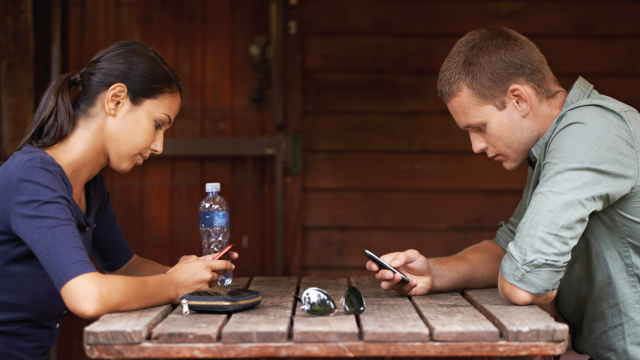
Pew Research Center has long studied the changing nature of romantic relationships as well as the role of digital technology in people’s lives. This particular report focuses on the patterns, experiences and attitudes related to digital technology use in romantic relationships. These findings are based on a survey conducted Oct. 16 to 28, 2019, among 4,860 U.S. adults. This includes those who took part as members of Pew Research Center’s American Trends Panel (ATP), an online survey panel that is recruited through national, random sampling of residential addresses, as well as respondents from the Ipsos KnowledgePanel who indicated that they identify as lesbian, gay or bisexual (LGB). The margin of sampling error for the full sample is plus or minus 2.1 percentage points.
Recruiting ATP panelists by phone or mail ensures that nearly all U.S. adults have a chance of selection. This gives us confidence that any sample can represent the whole U.S. adult population (see our Methods 101 explainer on random sampling). To further ensure that each ATP survey reflects a balanced cross-section of the nation, the data is weighted to match the U.S. adult population by gender, race, ethnicity, partisan affiliation, education and other categories.
For more, see the report’s Methodology . You can also find the questions asked, and the answers the public provided in the topline .
Amid growing debates about the impact of smartphones and social media on romantic relationships, a Pew Research Center survey conducted in October 2019 finds that many Americans encounter some tech-related struggles with their significant others.
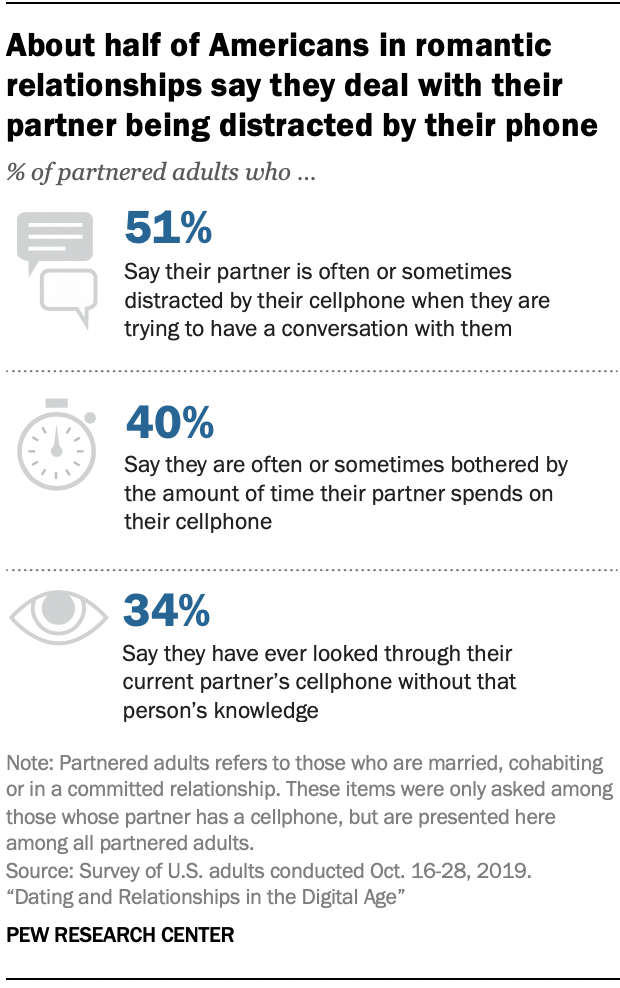
Partnered adults under the age of 50 are particularly likely to express the feeling that their partner is distracted by their phone, with those ages 30 to 49 most likely to report this. Fully 62% of 30- to 49-year-olds and 52% of 18-to 29-year-olds who are in a romantic relationship say their partner is at least sometimes distracted by their phone when they’re trying to talk them. Still, this issue is not confined to younger age groups: 41% of partnered Americans ages 50 and older say they have encountered this in their relationship at least sometimes.
With phones being such a distraction, people might be tempted to look through their partner’s phone. However, there is widespread agreement among the public that digital snooping in couples is unacceptable. Seven-in-ten Americans – regardless of whether they are in a relationship – say it is rarely or never acceptable for someone to look through their partner’s cellphone without that person’s knowledge. Still, 34% of partnered adults say they have looked through their partner’s cellphone without that person’s knowledge, with women being more likely than men to say they have done this (42% vs. 25%).
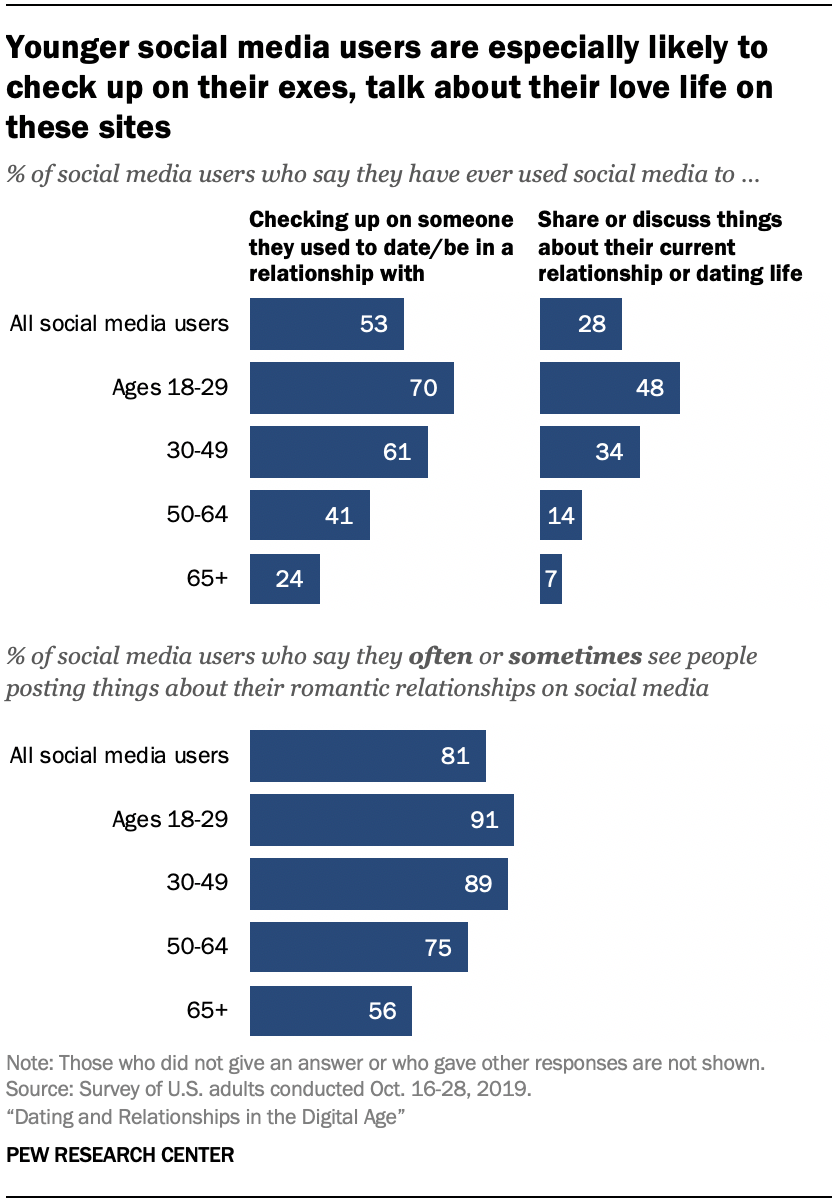
Moreover, social media has become a place where some users discuss relationships and investigate old ones. Roughly half of social media users (53%) say they have used these platforms to check up on someone they used to date or be in a relationship with, while 28% say they have used social media to share or discuss things about their relationship or dating life. For adult users under the age of 30, those shares who have used social media to checked-up on a former partner (70%) or posted about their own love life (48%) are even higher.
But social media can also be a source of annoyance and conflict for some couples. Among those whose partner uses social media, 23% say they have felt jealous or unsure of their relationship because of the way their current partner interacts with others on these sites, and this share rises to 34% among those ages 18 to 29.
Still, some users view these platforms as an important venue for showing love and affection. This is especially true for younger users who are partnered: 48% of 18- to 29-year-old social media users say social media is very or somewhat important for them in showing how much they care about their partner.
These are some of the main findings from a nationally representative survey of 4,860 U.S. adults conducted online Oct. 16 to 28, 2019, using Pew Research Center’s American Trend Panel.
Terminology
40% of partnered adults say they are bothered by the amount of time their partner spends on their cellphone.
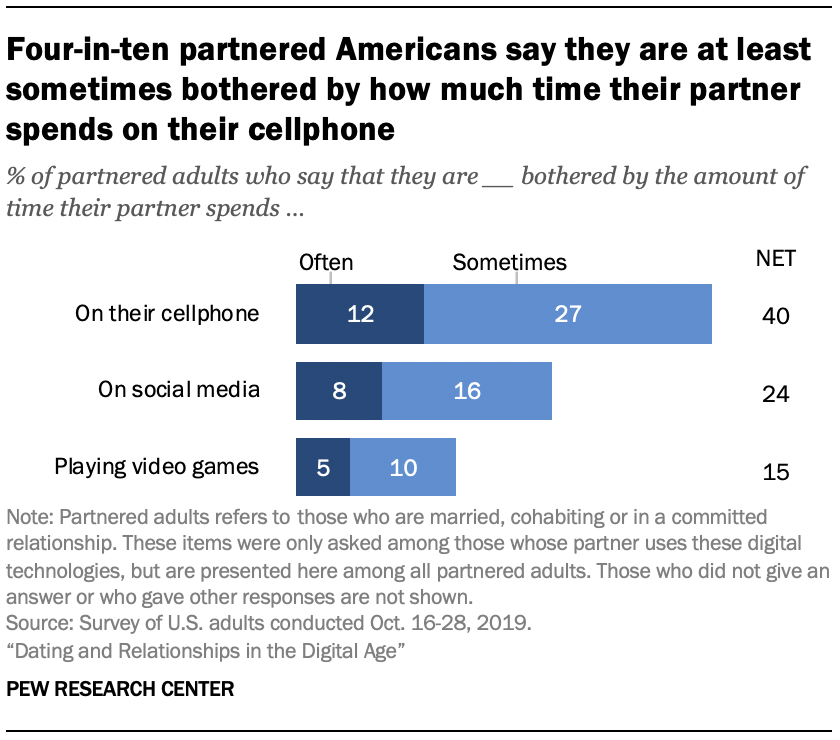
In addition, 24% of partnered Americans report that they are at least sometimes bothered by the amount of time their partner spends on social media, while a somewhat smaller share (15%) say they feel this way about their partner playing video games.
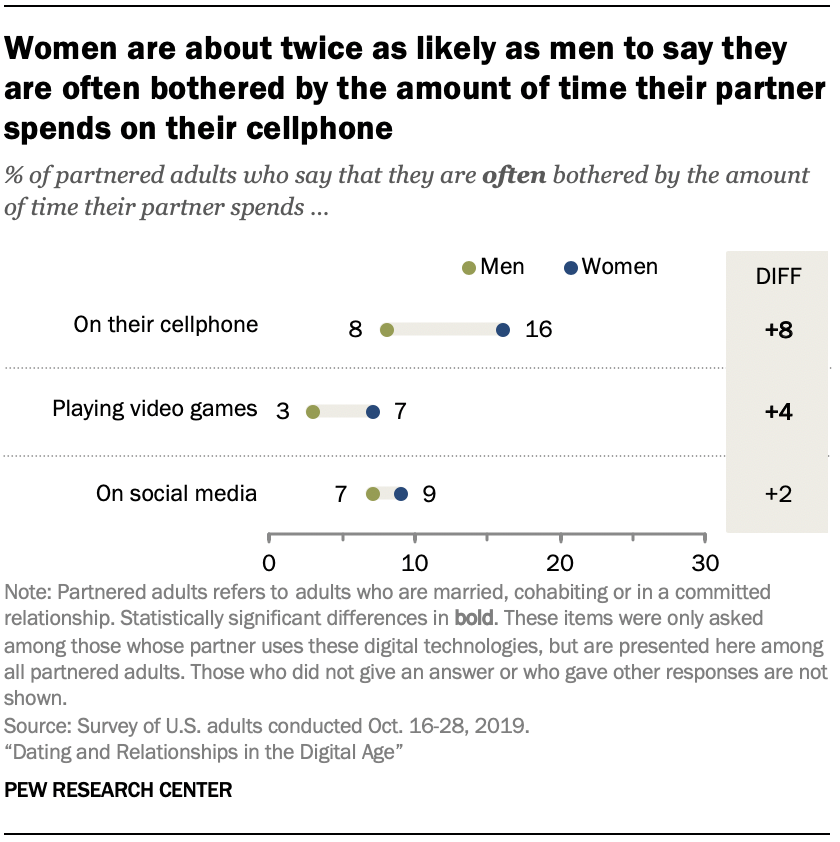
Beyond gender differences, people’s attitudes also vary by age. Some 18% of partnered adults ages 18 to 49 say they are often bothered by the amount of time their partner spends on their phone, compared with 6% of those ages 50 and older. Younger adults in romantic relationships also are more likely than their older counterparts to say they are often bothered by the amount of time their partner spends on social media (11% vs. 4%) and playing video games (7% vs. 3%).
Roughly half of partnered people say their significant other is distracted by their phone at least sometimes when they try to talk to them
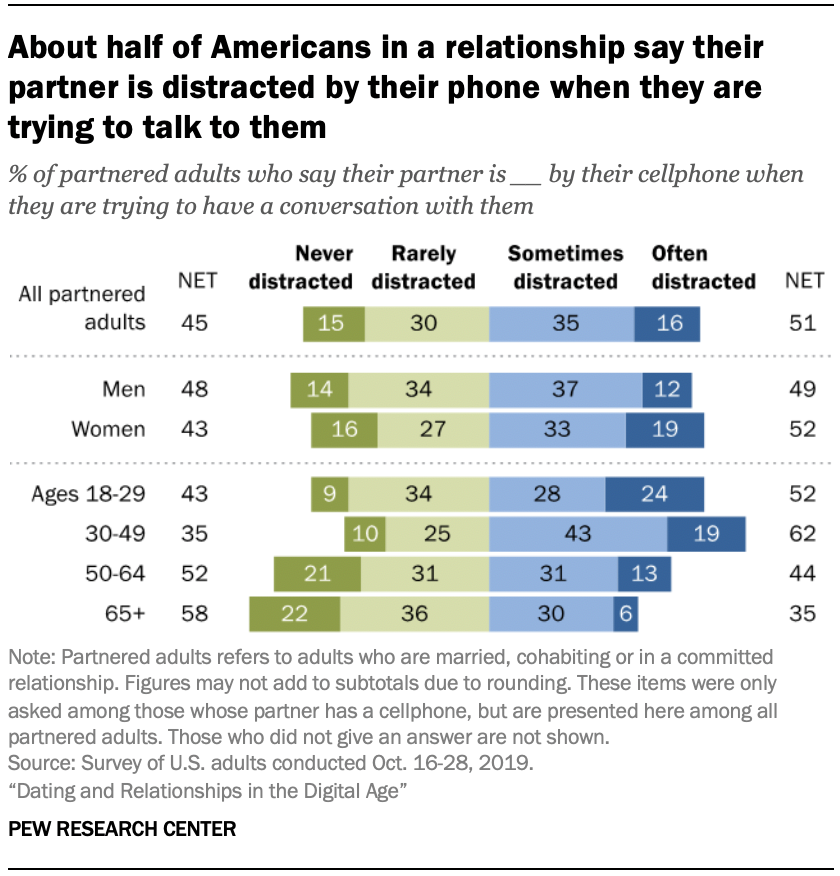
When asked to reflect on their partner’s cellphone use, 51% of Americans in a romantic relationship say their partner is at least sometimes distracted by their cellphone when they are trying to have a conversation with them, including 16% who say their significant other is often distracted by their mobile device.
This pattern differs by age: Roughly six-in-ten partnered adults ages 30 to 49 say their significant other is at least sometimes distracted by their cellphone when they are trying to hold a conversation with them, compared with 52% of those ages 18 to 29 and even smaller shares for those ages 50 and older (41%). Among those in relationships, younger adults also are more likely than older adults to assert that their partner is often distracted by their phone when they are trying to have a discussion (20% vs. 10%).
Women who are in a relationship are more likely than men to say their partner is often distracted by their phone while they are trying to hold a conversation, but this gender difference is most pronounced among younger adults. Three-in-ten partnered women ages 18 to 29 say their significant other is often distracted by their phone while they are trying to hold a conversation, compared with 15% of men in this age group who say this.
About one-in-three partnered adults say they have looked through their current spouse or partner’s phone without their knowledge, but there’s strong public consensus this is unacceptable
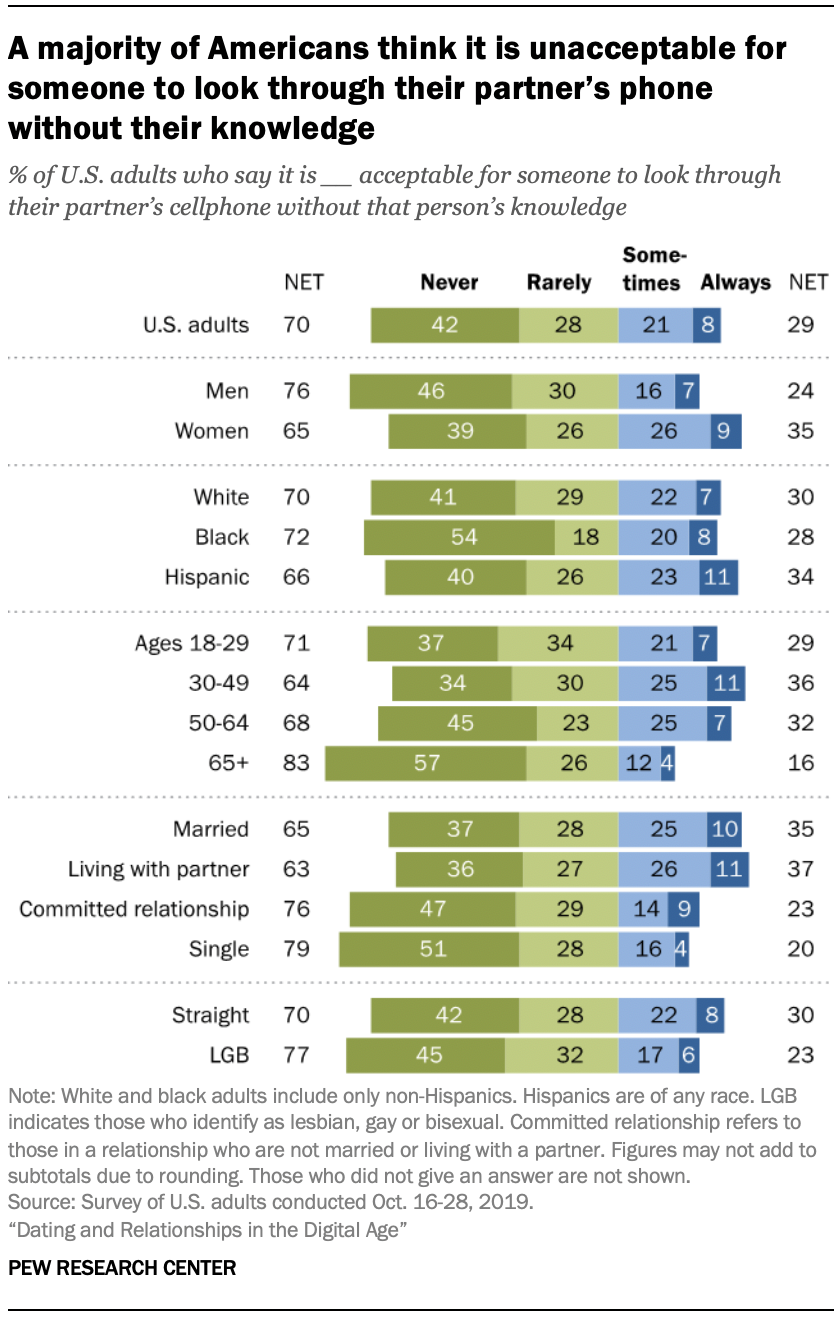
Majorities across major demographic groups view these actions as unacceptable, but there are some Americans who are more accepting of this behavior than others.
Women are more likely than men to think it is at least sometimes acceptable for someone to look through their partner’s cellphone without their knowledge (35% vs. 24%). And about one-third of adults under the age of 65 (33%) view this as acceptable, compared with 16% of those 65 and older.
Americans’ views on the acceptability of looking through a partner’s phone varies by current relationship status. Americans who are married or cohabiting are more likely than those who are single or in a committed relationship to say that looking through a significant other’s phone without that person’s knowledge is sometimes or always acceptable.

Among adults who are partnered, women are far more likely than men to report that they have looked through their current partner’s phone without that person’s knowledge (42% vs. 25%). And while 52% of partnered adults ages 18 to 29 say they have done this, those shares are 41% among those ages 30 to 49, 29% among those ages 50 to 64 and 13% among those 65 and older.
These actions also vary by the type of relationship. Roughly four-in-ten Americans (41%) who are living with a partner report that they have looked through their current partner’s phone without that person’s knowledge, compared with 27% of those who are in committed relationship and 34% of those who are married. However, this pattern is largely due age differences in relationship status, as twice as many adults under 50 live with a partner than do those 50 and older. While 48% cohabiters under 50 report having gone through their partner’s phone without that person’s knowledge, only 18% of cohabiters ages 50 and older say the same.
There also are some differences by race and ethnicity. About half of Hispanic adults who are in a relationship say they have looked through their partner’s phone, compared with a third among their black or white counterparts.
Those in partnered relationships also are more likely to look through their partner’s cellphone without that person’s knowledge if they think it is acceptable to do so (61% say they have done this). Smaller shares of partnered adults who deem this unacceptable say they have personally gone through their current partner’s phone – though still about one-in-five say they have done this.
It is fairly common for partners to share the password or passcode to their cellphone
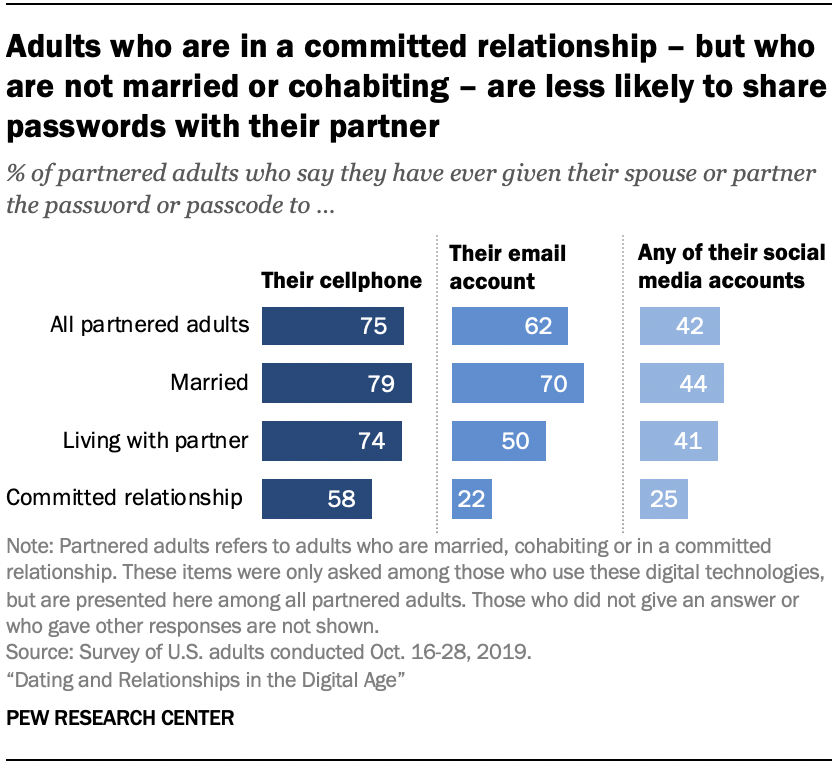
There also are some differences by age. Among partnered adults, those ages 18 to 49 are more likely than those ages 50 and older to say they have given their cellphone password to their spouse or partner (81% vs. 69%). On the other hand, older adults are more likely than younger adults to say they have shared their email password with their significant other (70% vs. 59%).
Most social media users see other people post about their relationship or dating life, but relatively few say these posts affect how they feel about their own relationship
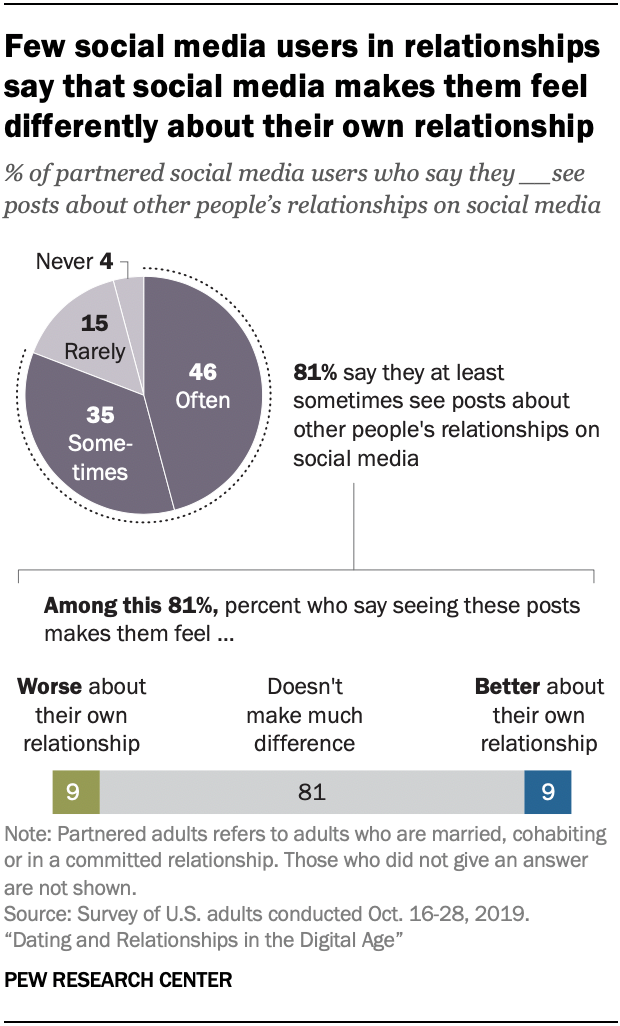
Overall, eight-in-ten social media users see others post about their relationship on social media often or sometimes. This differs by both age and gender. Women are slightly more likely than men to see these posts (84% vs. 77%). In addition, 90% of social media users ages 18 to 49 say they see these types of post at least sometimes, compared with 68% of those ages 50 and older.
A majority of social media users who are in a relationship (81%) say they see posts about other people’s relationships when using social media. Among these partnered social media users, 78% of those who are married say they at least sometimes see posts about other people’s relationships, compared with 89% of those who are living with partner and 86% of those in a committed relationship.
Overall, seeing these posts appears to have little effect on how people view their own romantic relationships. A large majority of partnered adults (81%) who at least sometimes see posts about other people’s relationships say that these posts have not made much of difference in how they feel about their own relationship. On the other hand, relatively few say these posts make them feel better (9%) or worse (9%) about their relationship.
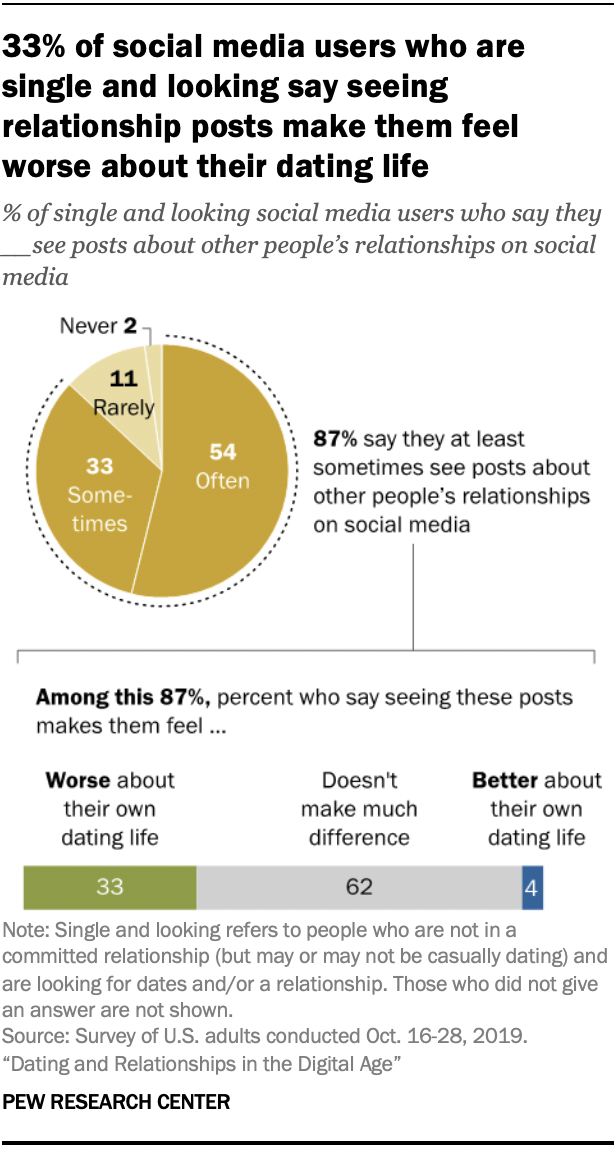
A third of the social media users who are single and looking and who say they see others’ posts about their love life say that seeing these posts makes them feel worse. This compares with 62% who report that such posts by others do not make much of a difference in how they feel about their own dating life. Just 4% say it makes them feel better.
These relationship-focused posts tend to have a bigger impact on women than men. Among social media users who are single and looking, women who see relationships posts at least sometimes are more likely to report that seeing these posts on social media makes them feel worse about their dating lives than are their male counterparts (40% vs. 28%).
About three-in-ten social media users say they have discussed their love life on social media
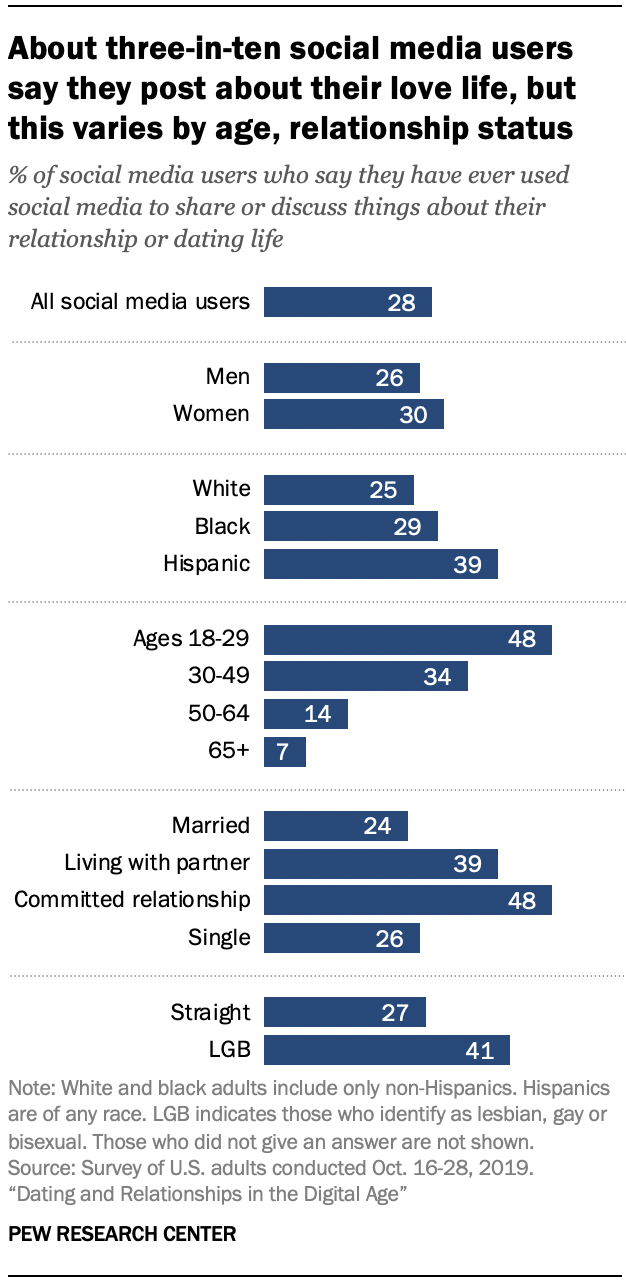
About four-in-ten social media users who are either Hispanic or lesbian, gay or bisexual (LGB) say they have ever posted about their dating life or relationship on social media, while around one-quarter of white, black and straight social media users say the same.
Younger social media users also are more likely to have posted about their love lives on social media previously. While about half of social media users ages 18 to 29 have ever posted on social media about their dating life or relationship, a third of 30- to 49-year-olds say the same. By comparison, far fewer social media users ages 50 and older (11%) say they ever post about their relationship or dating life.
Roughly half of social media users have used these sites to check up on an ex-romantic partner
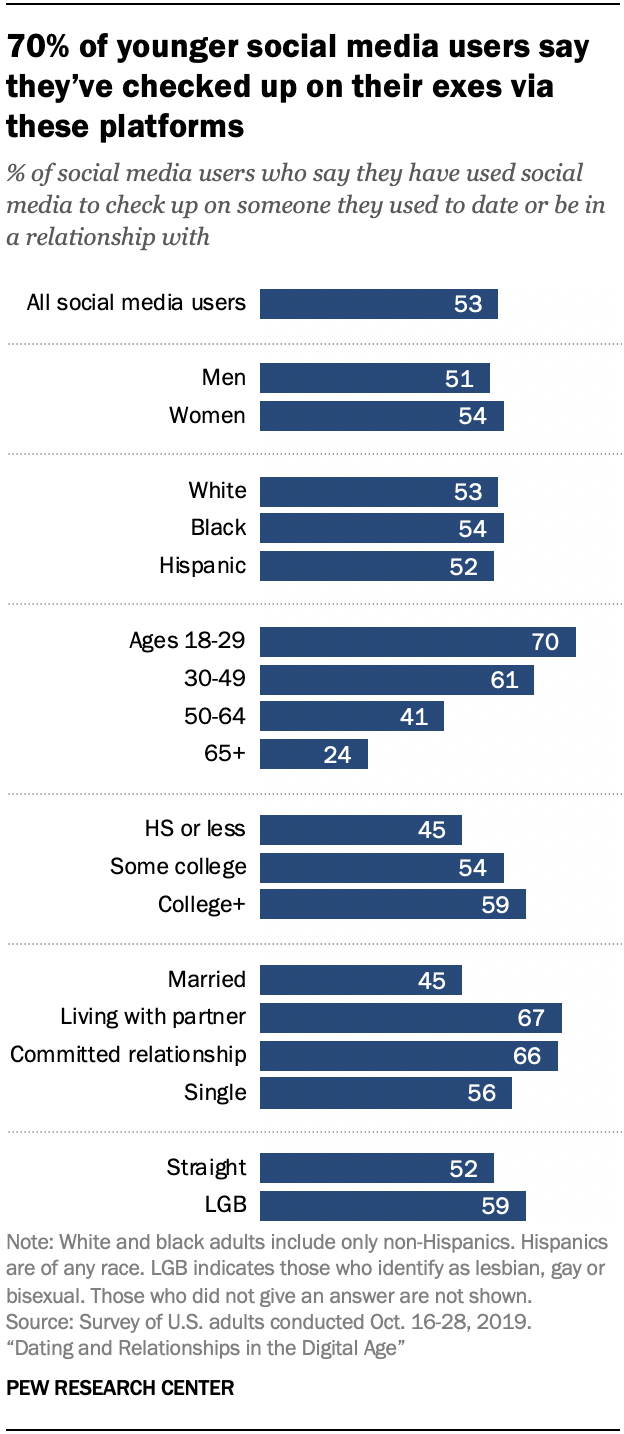
Social media users ages 18 to 49 are far more likely than those ages 50 and older to report using social media to check up on an ex-romantic partner. Seven-in-ten 18- to 29-year-olds report that they have used these platforms to check up on someone they used to date or be in a relationship with. That share is lower – though still a majority – among users ages 30 to 49 and falls sharply among those ages and 50 and older.
There also are some notable differences, depending on a person’s relationship status. About two-thirds each of social media users who are cohabiting or in a committed relationship say they have used social media to check up on someone they used to date. Meanwhile, 56% of single people, and even fewer married people (45%), say the same. In addition, social media users who have a high school degree or less education are less likely to report that they have used to social media to check up on an ex-romantic partner than those with a bachelor’s or advanced degree or who have some college experience.
Younger Americans in relationships are especially likely to view social media as having an important role in connecting and keeping up with their partner
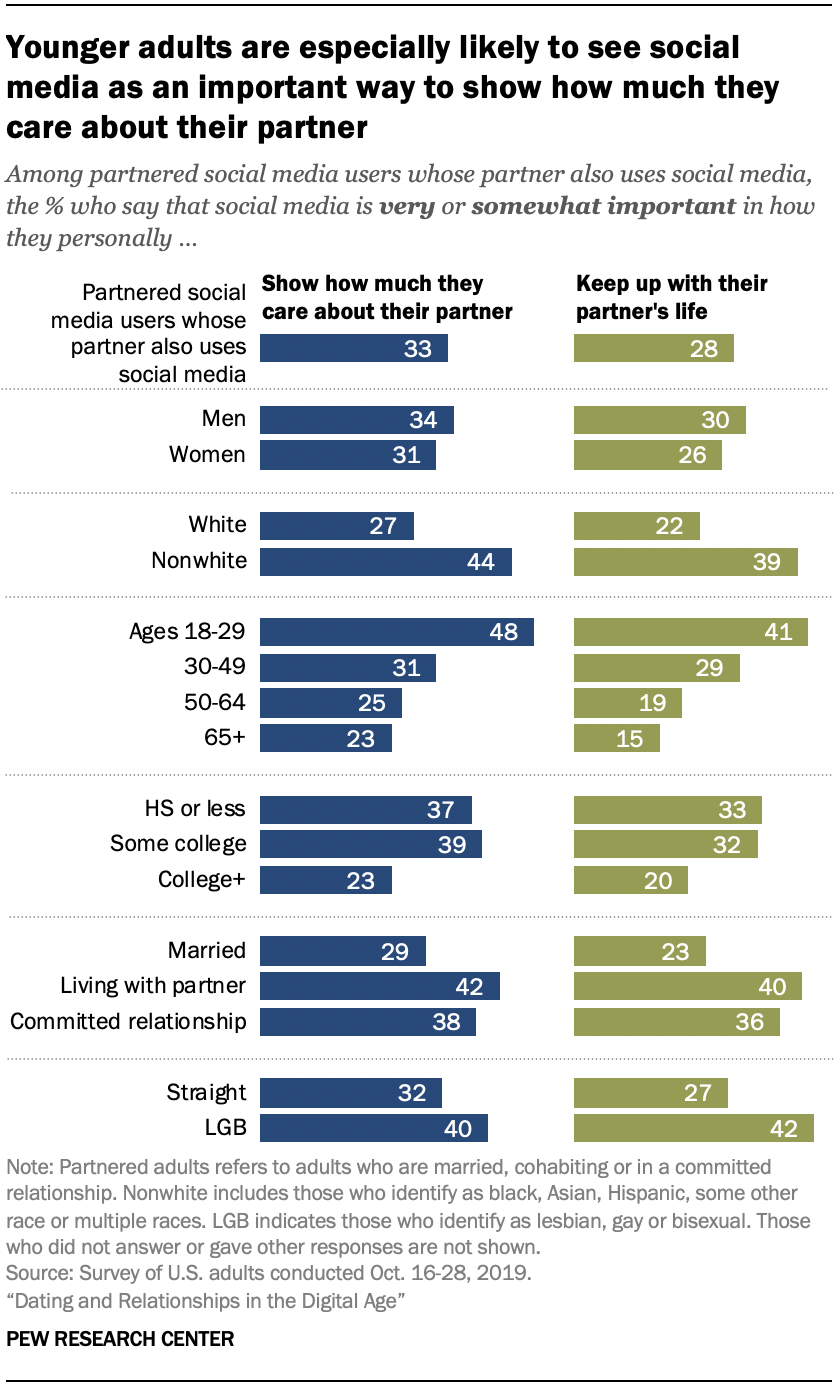
There also are age differences when it comes to the importance social media users place on these platforms for keeping up with their significant other’s life. About four-in-ten partnered users ages 18 to 29 say social media is somewhat or very important when it comes to keeping up with what’s going on in their partner’s life, compared with 29% of those ages 30 to 49 and only 17% of those ages 50 and older.
Married social media users are more likely than those who are cohabiting or in a committed relationship to say they do not see social media as important for keeping up with what’s going on in their partner’s life or for showing how much they care about their partner.
The level of importance that partnered adults place on social media also varies by race and ethnicity as well as by sexual orientation. Nonwhite social media users are more likely than white users to say these platforms are a very or somewhat important for keeping up with their partner’s life and showing how much they care. 4 Among partnered social media users, LGB adults are more likely than those who are straight to say social media is at least somewhat important for keeping up with their partner’s life or showing how much they care.
Even when controlling for age, racial and ethnic differences persist when it comes to the likelihood of saying social media is a personally important way to keep up with one’s partner or show how much they care. Similarly, marital status and sexual orientation are significant predictors of how important it is for people to use social media to keep up with one’s partner, even after controlling for age differences.
Social media can be a source of jealousy and uncertainty in relationships – especially for younger adults
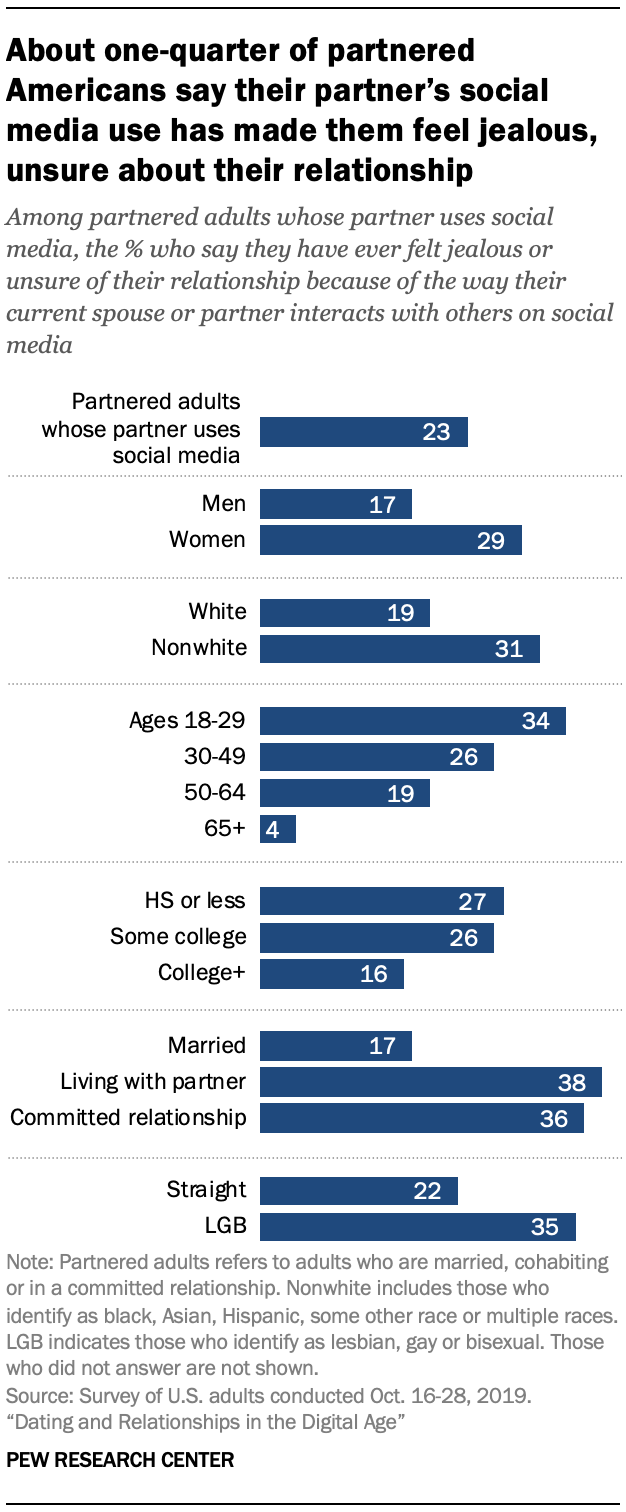
Overall, 23% of partnered adults whose significant other uses social media say they have felt jealous or unsure about their relationship because of the way their current spouse or partner interacts with other people on social media. But this share is even higher among those in younger age groups.
Among partnered adults whose significant other uses social media, 34% of 18- to 29-year-olds and 26% of those ages 30 to 49 say they have felt jealous or unsure in their current relationship because of how their partner interacted with others on social media, compared with 19% of those ages 50 to 64 who say this and 4% of those ages 65 and up. Nearly four-in-ten unmarried adults with partners who are social media users (37%) say they have felt this way about their current partner, while only 17% of married people say the same.
Women also are more likely to express displeasure with how their significant other interacts with others on social media. Women who say their partner uses social media are more likely than men to say they have felt jealous or unsure of their relationships because of how their partner interacts with others on social media (29% vs. 17%).
Among those whose partner uses social media, about three-in-ten nonwhite adults who are in a relationship report having felt jealous or uncertain in their current relationship based on their partner’s social media interactions, compared with 19% of white adults who say the same. About one-third of LGB partnered adults whose significant other uses social media report that they have felt jealous or unsure in their current relationship because of how their partner interacted with others on social media, while 22% of straight people say this. College graduates are less likely to report having felt this way than those with some college experience or a high school degree or less.
- These items were only asked among those whose partner uses these digital technologies, but are presented here among all partnered adults. This group does include portions of those who say their partner does not own a cellphone (4%), use social media (27%) or play videos games (47%). Please read the Methodology section for full details on how these questions were asked. ↩
- Prior research from 2019 shows that the majority of both men (84%) and women (79%) in the U.S. report owning a smartphone . In addition, about three-in-ten U.S. adults say they are online almost constantly , and this does not differ by gender. Prior work in 2018 found that men under 50 are more likely than women under 50 to report playing video games at least sometimes. ↩
- These items were only asked among those who use these digital technologies, but are presented here among all partnered adults. This group does include portions of those who say they do not use the internet or use social media. Please read the Methodology for full details on how these questions were asked. ↩
- Nonwhite includes those who identify as black, Asian, Hispanic, some other race or multiple races; these groups could not be analyzed separately due to sample size limitations. ↩
Sign up for our Internet, Science and Tech newsletter
New findings, delivered monthly
Report Materials
Table of contents, about half of never-married americans have used an online dating site or app, young women often face sexual harassment online u2013 including on dating sites and apps, shareable facts about americans’ experiences with online dating, most popular.
About Pew Research Center Pew Research Center is a nonpartisan fact tank that informs the public about the issues, attitudes and trends shaping the world. It conducts public opinion polling, demographic research, media content analysis and other empirical social science research. Pew Research Center does not take policy positions. It is a subsidiary of The Pew Charitable Trusts .

Cover Story
Modern love: scientific insights from 21st century dating.
- Personality/Social
- Relationships
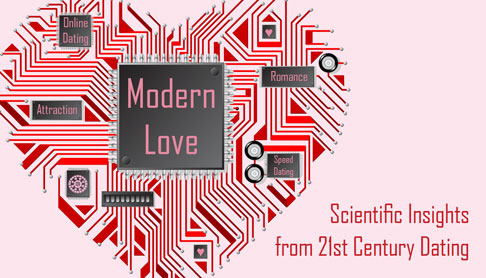
Take Your Pick
For millions of years, humans have been selecting mates using the wealth of information gleaned in face-to-face interactions — not just appearance, but characteristics such as tone of voice, body language, and scent, as well as immediate feedback to their own communications. Does mate selection differ when those looking are presented with an almost overwhelming number of potential partners, but limited to a few photos, statistics, and an introductory paragraph about each one? What information do online daters focus on? Is it all about the photo? Or are words the key to someone’s heart (or at least their Match.com inbox)? In one survey of Australian online daters, 85% said they would not contact someone without a posted photo, so physical appearance is indeed important (Fiore et al., 2008). A 2008 study in which participants rated actual online profiles confirmed this, but also explored the criteria that made certain photos attractive (Fiore et al., 2008). Men were considered more attractive when they looked genuine, extraverted, and feminine, but not overly warm or kind. (Although feminine male photos were seen as attractive, whole male profiles were rated more attractive when they seemed more masculine, a perplexing result worthy of more study.) Women were deemed more attractive when they looked feminine, high in self-esteem, and not selfish. This study also found that the narrative self-descriptive sections of the profiles played a key role in attractiveness, but the fixed choice sections of the profiles (where users have to pick from a specific set of descriptors, i.e., “Have children now,” “Want children someday,” “Don’t want children,” smoker/non-smoker, etc.) only minimally affected attractiveness ratings. However, these fixed choice descriptors allow users to triage by easily weeding out those who don’t meet their dealbreaker criteria for a partner (Fiore et al., 2008).
Researchers believe that users make up for the lack of information in online profiles by filling in the blanks with guesses based on small pieces of information. Some theorize that online daters may be wearing rose colored glasses when looking at potential dates — filling in the information gaps with positive qualities in a potential partner (Gibbs et al., 2006). In one study, knowing more information about a potential date generally led to liking them less, possibly because it called out inconsistencies and reduced opportunities to fill in the blanks with positive inferences. But, with a particularly compatible partner, more information led to more liking. For online daters, this means that a very detailed profile might attract fewer, but more compatible suitors (Norton et al., 2007).
Research has also revealed gender differences in both preference and messaging behavior on online dating sites. In particular, women and men differ in the relative importance they assign to various attributes of potential partners. A forthcoming study conducted by Günter Hitsch, Ali Hortaçsu (both at University of Chicago), and Dan Ariely (Duke University) confirmed existing evolutional theory, finding that in a sample of 22,000 online daters women weigh income more than physical attributes, including facial attractiveness, height and body mass index, when deciding who to contact (Hitsch et al., 2009). Interestingly, these differences persist even when reproduction is no longer a factor. In a study that looked at online daters across the lifespan, even older men “sought physical attractiveness and offered status-related information more than women” and women continued to be the more selective gender (Sears-Roberts Alterovitz & Mendelsohn, 2009).
In a nine-month study of participants on a dating site in 2008 and 2009, Andrew Fiore, a graduate student at the University of California, Berkeley, and his colleagues examined stated preferences and actual messaging behavior (Fiore et al., 2010). In general, women really are pickier than men — listing smaller ranges in their preferences for age and ethnicity. Women also initiate and reply to contact less than men. They were contacted much more than men and, hence, generally had their choice of who to reply to. But, just as in the face-to-face dating scene, respect is important — users who respected others’ listed preferences for a potential partner were more likely to get a response. In light of these findings, the researchers presented some advice to potential online daters: “Choose wisely and, if possible, be female” (Fiore et al., 2010).
This study also leads to some intriguing design ideas for online dating sites’ automatic matching systems, which present users with sets of likely partners. More popular users are contacted more and, therefore, are less likely to respond to any one user. Taking this into account, dating sites may want to steer users toward slightly less popular potential dates who are more likely to respond, “a trade-off many users may willingly accept” (Fiore et al., 2010).
What I Like About You Me

In a 2005 study, Fiore and Judith Donath (Massachusetts Institute of Technology) examined messaging data from 65,000 users of a United States-based dating site. They found that users preferred sameness on all of the categories they tested (a variety of features from child preferences to education to physical features like height). But some factors played a larger role than others, with marital status and wanting or already having children showing the strongest same-seeking. Fiore has also found that women responded more frequently to men whose popularity on the site (a measure based on the average number of people contacting the user per day) was similar to their own (Fiore, 2010).

Online dating service users tend to contact people who are about as attractive as they are, but does your own attractiveness level influence how attractive you believe others to be? One research team put this question to the test on the website HOTorNOT.com. The site was launched in 2000 purely for users to rate each other on how attractive (or, obviously, not) they were. Later, the site added an online dating component. This provided an extra set of information for researchers — not only knowing who’s talking to whom, but the overall attractiveness ratings of those users from everyone on the site. Consistent with previous research, this study, published in Psychological Science , found that people with similar levels of physical attractiveness indeed tend to date each other, with more attractive people being more particular about the physical attractiveness of their potential dates. Compared to females, males are more influenced by how physically attractive their potential dates are, but less affected by how attractive they themselves are when deciding whom to date. (But these findings about gender bias in attraction are being challenged in other studies – more on this later.) Also, regardless of how attractive people themselves are, they seem to judge others’ attractiveness in similar ways, supporting the notion that we have largely universal, culturally independent standards of beauty (e.g., symmetric faces; Lee et al., 2008).
Stretching (or Shrinking) the Truth
Assessing potential partners online hinges on other users being truthful in their descriptions. But what if they aren’t? Psychological scientists have turned to online dating to examine how truthful people are in their descriptions of themselves, both with themselves and to others. Online daters walk a fine line — everyone wants to make themselves as attractive as possible to potential dates, making deception very tempting. But, daters can’t be too deceptive, lest they actually get to the point of a real life meeting in which they could be exposed. Catalina Toma, Jeffrey Hancock (both at Cornell University), and Nicole Ellison (Michigan State University) examined the relationship between actual physical attributes and online self-descriptions of online daters in New York. They found that lying was ubiquitous, but usually fairly small in terms of magnitude. Men tended to lie about height and women tended to lie about weight. And the lying wasn’t due to self-deception — self-ratings of attributes tended to be accurate, even when information on the dating site was not (Toma, 2008).
The Need for Speed
Dan Ariely, a behavioral economist and co-author of the HOTorNOT.com study and the forth-coming article with Hitsch and Hortaçsu, was initially drawn to online dating because it seemed like a very nice solution to a common problem — people in need of partners and no market for them to find each other. But while online dating has yielded fascinating results about preferences and many real-world matches, it doesn’t work for every person looking for a mate because it is so difficult to quantify the qualities that lead to and keep attraction going. As Ariely said, attempting to sum up the myriad aspects of a person in an online dating profile can be like “describing a dish in a restaurant by its chemical composition.” It’s accurate, but it doesn’t provide useful information when deciding what to order. Another modern dating innovation may provide a better solution: speed dating.
In the late 1990s, a rabbi in Los Angeles created a new way for Jewish singles in his community to meet each other — they would go on many “dates” lasting just a few minutes in one night, report to the event organizers if they wanted to see any of their “dates” in the future, and, if two people said yes to each other, they would be given contact information to continue corresponding. Since then, speed dating has spread around the world, giving millions of singles a chance at love. It also gives savvy researchers an unprecedented chance to study attraction in situ .
In the winter of 2004, Eli Finkel and Paul Eastwick, both at Northwestern University at the time, thought that speed dating would be “a terrific way to catch initial attraction in action,” as Eastwick, now at Texas A&M, reported. This hunch was confirmed by a speed dating outing with several other Northwestern colleagues, and the researchers embarked a new track of speed dating work. (No word on whether the outing was a success from other standpoints.)
As Finkel and Eastwick point out in a 2008 study published in Current Directions in Psychological Science , the popularity of speed dating allows the collection of large, real world samples across cultures, ethnicities, and socioeconomic levels. The speed dating design also lets researchers to study both sides of a dyadic process. A speed dating event with 20 participants would yield 400 separate interactions, allowing researchers to create very detailed accounts of people’s attractions. For example, they would be able to tell that a certain woman liked a certain man because (a) she likes all the men (she has fewer dealbreaker standards), (b) all the women liked that man (he was an irresistible dish), or (c) they had a unique experience that made her like him more than other men at the event and him like her more than other women at the event (Finkel & Eastwick, 2008). Also, speed dating allows for exploring reciprocity effects. A 2007 Psychological Science article (Eastwick et al., 2007) found that liking can be reciprocal — if a women likes a certain man more than others, he is more likely to like her — but isn’t always reciprocal — if a woman likes all the men more than other women did, the men will generally like her less. As Finkel says, “romantic likers tend to be disliked.”
Speed dating empowers researchers to study interactions as they happen, rather than post-hoc reports. It also allows for testing actual versus stated preferences. One speed dating study showed that stated preferences do not match actual preferences and called into question the gender biases in attraction that have been well-documented elsewhere (i.e., that men see physical features as more important and women see earning prospects or security as more important), raising the specter of a disconnect between what we say we’re attracted to and what we’re actually attracted to (Eastwick & Finkel, 2008).
Speed dating studies also allow researchers to study the implications of simple changes in dating paradigms. For example, even in light of the emerging sexual equality of the last several decades, many women (and men) expect the man to play the pursuer at the beginning of romantic heterosexual relationships (Finkel & Eastwick, 2009). This idea holds true at speed dating events, where women generally stay seated while the men rotate. This set-up stems from vague notions of chivalry, but also from more mundane purposes — according to one speed dating company executive, women tend to have more stuff with them, like purses, and are therefore less efficient movers. Could this set-up in itself affect attraction? Turns out that it can. In most speed dating scenarios (as in most attraction scenarios in general) women are more selective. But, when women rotated, this effect disappeared and they became less selective than the men. The researchers purport that, consistent with an embodied-approach explanation, the physical act of being the one to approach could increase self-confidence leading to being more open to approaching romantic partners and, therefore, less selective (Finkel & Eastwick, 2009). (For more information on embodied cognition, see “The Body of Knowledge” in the January 2010 Observer .)
he search for love is never easy and attraction is never simple. Research into online matchmaking and speed dating is providing valuable insight into the human quest for romance, and this is only the beginning. Most of the research in this area to-date focuses on dating behavior of heterosexuals in the United States. More work is necessary to determine if the findings so far also apply to international daters and to understand the dynamics of homosexual pairings. Emerging methods may also bring new insight into dating dynamics. Finkel and Eastwick have begun using a coding scheme to study exactly what participants are saying during their dates, allowing them to potentially code what exactly makes a date great or awkward. As they say, “Is it better to be warm or a little cool and aloof? Is it better to communicate independence from or interdependence with your partner?” The duo has also begun to collect saliva samples from speed daters which they hope will allow them to explore “the biochemistry of romantic desire.” In the future, the search for love may be as simple as submitting saliva and waiting for a match, but for now those looking for love can at least take this new research to heart.
References and Further Reading
Eastwick, P.W., Finkel, E. J., Mochon, D., & Ariely, D. (2007). Selective versus unselective romantic desire: Not all reciprocity is created equal. Psychological Science , 18 , 317–319.
Eastwick, P.W., & Finkel, E.J. (2008). Sex differences in mate preferences revisited: Do people know what they initially desire in a romantic partner? Journal of Personality and Social Psychology , 94 , 245-264 .
Finkel, E.J., & Eastwick, P.W. (2009). Arbitrary social norms influence sex differences in romantic selectivity. Psychological Science , 20 , 1290-1295.
Finkel, E.J., & Eastwick, P.W. (2008). Speed-dating. Current Directions in Psychological Science , 17 , 193-197.
Fiore, A.T., & Donath, J.S. (2005). Homophily in online dating: When do you like someone like yourself? Short Paper, ACM Computer-Human Interaction 2005.
Fiore, A.T., & Donath, J.S. (2004). Online personals: An overview . Short Paper, ACM Computer-Human Interaction 2004 .
Fiore, A T., Taylor, L S., Mendelsohn, G.A., & Hearst, M. (2008). Assessing attractiveness in online dating profiles . Short Paper, ACM Computer-Human Interaction 2008.
Fiore, A.T., Taylor, L.S., Zhong, X., Mendelsohn, G.A., & Cheshire, C. (2010). Who’s right and who writes: People, profiles, contacts, and replies in online dating. In Proceedings of Hawai’i International Conference on System Sciences, 43 .
Gibbs, J.L., Ellison, N.B., & Heino, R.D. (2006). Self-presentation in online personals: The role of anticipated future interaction, self-disclosure, and perceived success in Internet dating . Communication Research , 33 , 1-26.
Hitsch, G.J., Hortaçsu, A., & Ariely, D. (in press). Matching and sorting in online dating. American Economic Review.
Hitsch, G.J., Hortaçsu, A., & Ariely, D. (2009). What makes you click: An empirical analysis of online dating. Working Paper, retrieved Jan. 2010 from: http://home.uchicago.edu/~hortacsu/onlinedating.pdf
Lee, L., Loewenstein, G., Ariely, D., Hong, J., & Young, J. (2008). If I’m not hot, are you hot or not? Physical-attractiveness evaluations and dating preferences as a function of one’s own attractiveness. Psychological Science , 19 , 669-677.
Norton, M., Frost, J., & Ariely, D. (2007). Less is more: The lure of ambiguity, or why familiarity breeds contempt. Journal of Personality and Social Psychology , 92, 97-105.
Sears-Roberts Alterovitz, S., & Mendelsohn, G.A. (2009). Partner preferences across the life span: Online dating by older adults, Psychology and Aging , 24 , 513-517.
Toma, C., Hancock, J., & Ellison, N. (2008). Separating fact from fiction: An examination of deceptive self-presentation in online dating profiles. Personality and Social Psychology Bulletin, 34 , 1023-1036.
APS regularly opens certain online articles for discussion on our website. Effective February 2021, you must be a logged-in APS member to post comments. By posting a comment, you agree to our Community Guidelines and the display of your profile information, including your name and affiliation. Any opinions, findings, conclusions, or recommendations present in article comments are those of the writers and do not necessarily reflect the views of APS or the article’s author. For more information, please see our Community Guidelines .
Please login with your APS account to comment.

Does Psychology Need More Effective Suspicion Probes?
Suspicion probes are meant to inform researchers about how participants’ beliefs may have influenced the outcome of a study, but it remains unclear what these unverified probes are really measuring or how they are currently being used.

Science in Service: Shaping Federal Support of Scientific Research
Social psychologist Elizabeth Necka shares her experiences as a program officer at the National Institute on Aging.

A Very Human Answer to One of AI’s Deepest Dilemmas
Imagine that we designed a fully intelligent, autonomous robot that acted on the world to accomplish its goals. How could we make sure that it would want the same things we do? Alison Gopnik explores. Read or listen!

Privacy Overview
We use cookies to enhance our website for you. Proceed if you agree to this policy or learn more about it.
- Essay Database >
- Essay Examples >
- Essays Topics >
- Essay on Sociology
Online Dating Vs. Traditional Dating Essay
Type of paper: Essay
Topic: Sociology , Business , Internet , Development , Life , Dating , Information , Time
Published: 03/22/2020
ORDER PAPER LIKE THIS
Finding a partner has never been easy and often the process is uncertain, frustrating and can be lonely. Human beings are social beings, and we feel nice when we are loved or treasured by our significant other. This explains why most people are ready to go to any length to get a partner, a soul mate or a lover. The new technology has brought new changes in the world and one of the areas where the internet has brought a revolutionary change is the dating scene. People are now moving to the internet to find soul mates and life partners. Online dating is a personal introductory kind of a system where individuals find and contact one another over the internet to arrange a meeting or a date for that matter with the intention of developing a romantic, personal or sexual relationship. On the other hand, traditional dating involves meeting a person face to face for the first time and later developing the relationship by either meeting out for dinner or having fun together. Internet dating is slowly replacing traditional dating however traditional dating is still common, and many couples practice it. A lot of people are “e-dating” with hope of finding that perfect individual who they can spend some time with or settle down with. Online dating just like traditional dating has its advantages and disadvantages, but scholars argue that it has a lot of advantages than the traditional dating. It has the advantage to the people who may be uncomfortable meeting new people physically for the first time or who are new to the area. This process can be done from the comfort of an individual’s room and it is also convenient for those who have other responsibilities such as tight work schedules, travelling or other commitments in life that make going out to social places impossible. The internet has provided services that try to make the process of finding love as painless as possible, the dating services has chat rooms that individuals can get to know the other person without having the need to exchange contacts or photos. As the friendship grows, the two people can go forward and exchange contacts or plan to meet. Traditional dating can be a bit challenging since it most of the time involves striking a conversation with a stranger who may choose to ignore you. This can be awkward since it also requires frequent visits to the social places in an effort to find someone. The modern living has seen a reduction in the time we have to socialize since most of the time people are working or engaging into other business activities, these have put traditional dating at a disadvantage. In online dating, an individual has the comfort of browsing profiles of potential partners without the need to meet them physical. This enables him or her to narrow down to what he or she is looking for. However, the experience of meeting someone online may be impersonal and thrilling as compared to the excitement and the instant attraction of meeting someone for the first time in the traditional dating. Online dating usually provides an individual’s profile which includes a person’s photo, career aspirations, favorite movies and other basic information. The information often provided makes the process of starting a conversion less challenging since an individual knows some a bit of information about that person. On the other hand, traditional dating goes step by step that preserves an element of mystery that creates excitement as the two individuals goes on to know one another in the future. In traditional dating, there are rarely logistical issues since the individuals meet face to face as compared to the online dating which due to the increased scope. An individual may be dating another person living in another country, and it may be difficult to meet due to the travel concerns. When engaging in the traditional dating, a person is well aware of who they are dealing with which eliminates the chances of an individual lying about who they are or exaggerating their personal traits. In online dating, fake dates may exaggerate their history or personal attributes with an attempt to lure unsuspecting daters. This has been an issue in the recent years when date particularly teenager’s meet unscrupulous dates online and are lured into social evils without their consent. Traditional dating gives an individual the chance to ask friends and family more information about the other person before accepting to go out with them. This is not possible with the online kind of dating.
In conclusion, both online and traditional dating provides an opportunity for individual to meet that perfect someone, while online dating has recently been preferred due to our modern busy life, it has also its pitfalls that an individual needs to consider before engaging him or herself in it.Traditional dating also provides some aspects that are quite interesting even if it is being considered as outdated by many people; the individual has the choice to decide the best method suitable for them.
Colmer, R. S., & Thomas, T. M. (2005). The senior's guide to dating (again): Traditional and online. Chelsea, Mich: Eklektika Press. Elisar, S. (2007). Everyone's Guide to Online Dating: How to Find Love and Friendship on the Internet. Oxford: How To Books.

Cite this page
Share with friends using:
Removal Request

Finished papers: 2989
This paper is created by writer with
ID 288163721
If you want your paper to be:
Well-researched, fact-checked, and accurate
Original, fresh, based on current data
Eloquently written and immaculately formatted
275 words = 1 page double-spaced

Get your papers done by pros!
Other Pages
Networking business plans, leonardo da vinci argumentative essays, beowulf argumentative essays, traditional approach argumentative essays, nasa argumentative essays, nepal argumentative essays, krishna argumentative essays, marilyn monroe argumentative essays, franz kafka argumentative essays, jungle argumentative essays, iphone argumentative essays, the affluent worker in the class structure essay, movie commentary on the linguists movie review example, free research paper on company overview, good example of course work on bank reconciliation, how groups begin in relation to social work literature review samples, history of video games research paper samples, good revealing the masque of desire essay example, good example of essay on new jersey government, essay on the tortilla curtain 2, managing your time and study environment essays examples, ideas are more powerful than guns argumentative essay examples, free research paper on default and dispute, essay on child labor law, example of essay on criminal law immigration, the atlantic world argumentative essay example, fascism and nazism essay example, example of essay on driving age, free exploring the enduring and epic masterpiece shakespeares macbeth research paper sample, human resource management essay samples, free history of east asia essay example, good essay about relativism vs absolutism, essay on eazy clean wear product scenarios, good report on coil and magnetic experiment, good research paper on geothermal energy, multiwall essays, drencher essays, methylparaben essays, dung essays, anterograde essays, dally essays, diethyl essays.
Password recovery email has been sent to [email protected]
Use your new password to log in
You are not register!
By clicking Register, you agree to our Terms of Service and that you have read our Privacy Policy .
Now you can download documents directly to your device!
Check your email! An email with your password has already been sent to you! Now you can download documents directly to your device.
or Use the QR code to Save this Paper to Your Phone
The sample is NOT original!
Short on a deadline?
Don't waste time. Get help with 11% off using code - GETWOWED
No, thanks! I'm fine with missing my deadline
- The Junkee Takeaway
- About Junkee
- Privacy Policy
- Terms of Use
We Broke Down The Pros And Cons Of Online Dating v Real Life Dating
How good is dating from your couch tho?
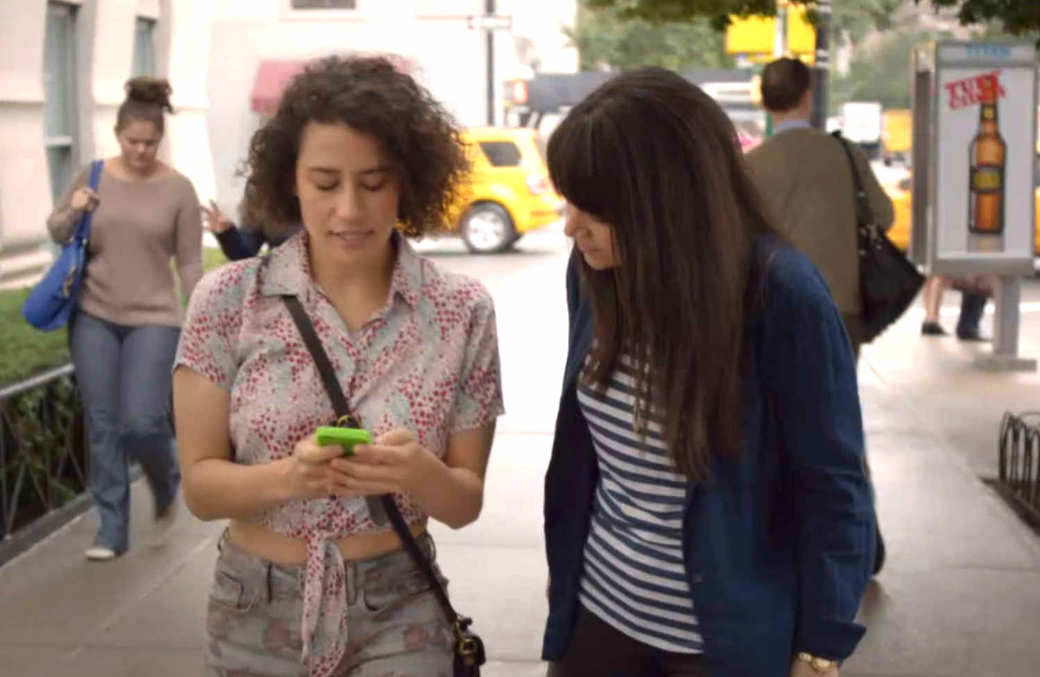
Want more Junkee in your life? Sign up to our newsletter , and follow us on Instagram , Twitter and Facebook so you always know where to find us.
With the age of Tinder, Grindr and Bumble letting us get our dating game on from the couch, the traditional world of real life dating has been slowly declining.
However, we don’t think it’s entirely dead. For those who feel lost when it comes to the dating scene, you’re not the only one. We’ve broken down the pros and cons so you can get out there and meet your soulmate.
Online Dating
Pro: online dating is super convenient.
Almost all the popular dating apps and websites are entirely free to join. Within a couple of minutes you can make a profile and start hunting for ‘the one’.
You can easily swipe left or right, message people who are interested and possibly meet up by the time the weekend rolls around. All from your the comfort of your couch.
CON: Online Dating Can Be Dangerous
While we all think we’re technologically savvy, there’s still a chance that someone can fool you with a fake online persona. If we become entirely engrossed in an individual, it’s hard to notice the red flags.
Just because they’ve got a nice photo and you’ve been texting for a long period of time, doesn’t mean you should entirely trust them. It’s always a good idea to meet up IRL in a public place to confirm they are who they say they are.
PRO: You Can Easily Avoid People
The good thing about online dating is that you don’t have to meet the person until you feel comfortable. If you don’t like them, you can easily block them and never deal with it again; something that’s super hard to do IRL.
It’s also easier for introverts to flourish online as it takes away the social awkwardness.
CON: People Can Lie About Themselves
People can say whatever they want about their life online. You could meet Gary, who says he’s on an NBA team but has really never played a game of basketball in his life. Nice try, Gary. You can’t believe everything you’re told.
Real-Life Dating
Pro: real life dating is so romantic.
When I first started uni, I remember the Dean of my Faculty saying that our soulmate could be in our tutorial, lecture or sitting here in the very same room. It’s not the point of uni, but it’s an interesting thing to think about.
Meeting and bonding over someone you met at uni, a concert or mutual friends is super romantic. You can actually meet them and see the bond in real life time, rather than on the screen.
CON: It Can Get Super Awkward
Real-life dating can cause potential problems if you end up dating one of your friends. If it all goes haywire, it will result in not only one painful break up but multiple. You could find yourself in a situation where you’ve split up a friendship circle or caused rifts between your friends.
PRO: You Know Exactly Who The Person Is
Unlike online dating where you can create a new identity, it’s a lot less likely for someone to do that in real life. Liars are easily caught out.
In real-life, you can be sure that the person is actually real which will make it easier to trust what they say about their study, interests and career. They have a name, a voice and a real-life body compared to just a photo and a few messages on a Tinder or Bumble profile.
CON: It’s Tough For Shy People
This is sort of a pro, sort of a con. Online dating seems to favour introverted people, while extroverts probably find real-life dating their strength.
If you’re a shy person, you might find it hard to meet new people and strike up conversations with strangers. It might be tough for you! Extroverts, though: you’ve got it good.
Sinead Simpkins studies Master of Arts at University of New England. When she’s not studying, she’s still waiting for her Hogwarts letter.
(Lead image: Broad City/Comedy Central)

- Relationships
Virtual vs Real-World Relationships
Neighbors can be a valuable source of social support..
Posted October 15, 2012
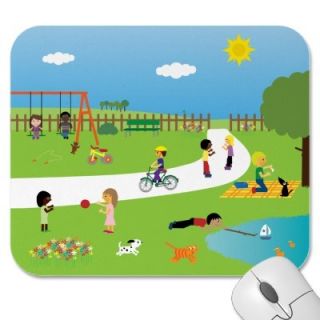
It has been argued that neighborhood environments are becoming redundant as technology and mobility allow us to draw on broad social networks. I beg to differ.
As a mother of young children who works predominantly from home, I spend a lot of time in my neighborhood. Having only recently moved to the suburban fringe, I am yet to develop a strong local support system.
On those days I crave connection and adult conversation, I invariably find myself surfing the internet. While not an active participant, I’ve spent years observing the development of online communities through personal blogs and photo-sharing sites such as Flickr. I’ve often watched people reflect on the reasons behind their online presence. Time and time again, they comment on the support they receive from like-minded individuals and the accompanying sense of community. While these connections undoubtedly have a place in society, I question whether they are an adequate substitute for real-world relationships, particularly those between neighbors.
The close proximity of neighbors perpetuates unique opportunities for social interaction and support, such as providing surveillance of people’s homes, collecting mail, or watching children in emergencies. Both neighbors and neighborhoods are particularly important for less mobile residents such as people working from home, the elderly, parents of young children, and single car households.
For example, when my trip to the hospital was cut fine during the labor of my second child, it was a neighbor who cared for my toddler until family help arrived. When I sprained my ankle at a local park, it was a nearby friend who not only came to rescue us, but fed and showered my son until his father could collect him.
Social support is a strong predictor of mental health. Perceived emotional support has been shown to protect against stressful life events linked to depression , while social isolation has been associated with the risk of depression in later life. In addition, low levels of social support have been associated with higher mortality from almost every cause of death.
I still have a long way to go in building a local network. With my children’s three day-time naps to accommodate and a never-ending to-do list, making time to meet new people can be a logistical nightmare. And, let’s face it: making new friends can be daunting!
I have no doubt, however, that the effort required to make friends within my neighborhood will be far outweighed by the potential benefits. These efforts can range from spending time in the front garden and greeting passing neighbors to more involved activities such as organizing a street party.
In keeping with current research, most of my neighborhood friendships have arisen from activities that have involved my children. Parents’ groups, playgroups, schools and sporting teams are just some of the avenues through which people can make new acquaintances. Options that don’t necessarily involve children include local gyms, community centers, Resident Associations and community gardens.
I’m even spending more time walking within my neighborhood. While exercise is my main motivation , passive, face-to-face contacts of repeated and increasing length have been said to be a basis for developing friendships. Studies have also shown that walking within the neighborhood encourages social interaction.
The internet is a marvelous tool for connecting us with people we would normally never meet. In many ways, social media allows us to maintain friendships easier than ever. However, I do wonder if time spent maintaining online friendships is at the expense of our real-life interactions, which may have more to offer in terms of practical, if not emotional, support. I hope you will consider the real and potential friendships that may be just beyond your doorstep.

As is often the case, those things which have the potential to add value to our lives, also have the potential to detract. In my next post I will discuss some of the negative consequences of knowing our neighbors.
Francis, J., Giles-Corti, B., Wood, L., Knuiman, M. 2012. Creating sense of community: The role of public space, Journal of Environmental Psychology , vol. 32, pp. 401-409.
Berkman, L. F., Glass, T., Brissette, I. and Seeman, T. E. 2000. From social integration to health: Durkheim in the new millennium, Social Science & Medicine, vol. 51, pp. 843-857.
Gallicchio, L., Hoffman, S. C. and Helzlsouer, K. J. 2007. The relationship between gender , social support, and health-related quality of life in a community-based study in Washington County, Maryland, Quality of Life Research, vol. 16, no. 5, pp. 777-786.
WHO. 2003. Social Determinants of Health: The solid facts. R. Wilkinson and M. Marmot. Denmark, World Health Organisation.
Wood, L.J., Giles-Corti, B., Zubrick, S.R., Bulsara, M.K. 2012, “Through the kids … we connected with our community”: Children as catalysts of social capital, Environment and Behavior, xxx, pp.1-25.
Lund, H. 2003. Testing the claims of new urbanism: local access, pedestrian travel and neighboring behaviors, Journal of the American Planning Association, vol. 69, no. 4, pp. 414-429.

Jacinta Francis, Ph.D. , is a Research Associate with the Centre for the Built Environment and Health at The University of Western Australia.
- Find a Therapist
- Find a Treatment Center
- Find a Psychiatrist
- Find a Support Group
- Find Teletherapy
- United States
- Brooklyn, NY
- Chicago, IL
- Houston, TX
- Los Angeles, CA
- New York, NY
- Portland, OR
- San Diego, CA
- San Francisco, CA
- Seattle, WA
- Washington, DC
- Asperger's
- Bipolar Disorder
- Chronic Pain
- Eating Disorders
- Passive Aggression
- Personality
- Goal Setting
- Positive Psychology
- Stopping Smoking
- Low Sexual Desire
- Child Development
- Therapy Center NEW
- Diagnosis Dictionary
- Types of Therapy

Understanding what emotional intelligence looks like and the steps needed to improve it could light a path to a more emotionally adept world.
- Coronavirus Disease 2019
- Affective Forecasting
- Neuroscience
- Share full article
Advertisement
Supported by
Dating on Apps, and the Old-Fashioned Way
More from our inbox:, donald trump and louis xiv, at stake in the election, the music business: tough for new talent, killing animals: avoid the euphemisms, memo to liberals.

To the Editor:
Re “ It’s Not You: Dating Apps Are Getting Worse ,” by Magdalene J. Taylor (Opinion guest essay, nytimes.com, March 16):
With more people on online dating platforms than ever, we have entered a new era rife with hot takes and opinions based on a narrow set of experiences. Recent surveys say that dating apps are the No. 1 way people meet today, and nearly 70 percent of individuals who met someone on a dating app said it led to a romantic, exclusive relationship.
I am not here to question individual experiences, or pretend that every date will lead to success. Matching two people is an imperfect science and rests on shared interests, complex personalities, timing and more. It’s an age-old axiom for a reason: You have to kiss a few frogs before you find your prince or princess.
But lately, we’ve been building to an environment where critiques of apps are presented as a monolith and pessimism over a bad date is taken to signal the end to a generation’s romantic future. There’s this false notion suggesting that dating apps don’t work. The numbers tell us that broadly speaking and for more people than ever: They work.
Bernard Kim Los Angeles The writer is chief executive officer of Match Group.
Re “ With Lackluster Growth, Dating Apps Are in Need of a Spark ” (front page, March 13):
There was a time when finding a partner was an adventure that played out in public spaces: the park while walking your dog, the bar while calming down from a hectic week, the art class that opened you up to new experiences and people.
Now apps let you sit on your sofa in your slippers and shop, viewing only what the app reveals. Are they kind? Would their smile make you look twice?
We used to live somewhere, interact with people we found there who had our approach to life — and would actually move if we found no synergy (why live somewhere that is like that?). These were all actions that led to personal connections.
So unless you are forced to live somewhere totally out of sync with your values, stop playing the game the apps have created and get off the sofa!
Susan Fraser Jacksonville, Fla.
Re “ Trump Seeks Full Immunity From 2020 Election Charges ” (news article, March 20):
Not even French kings in the pre-revolutionary Old Regime had the absolute immunity that Donald Trump believes he deserves.
In 1709 the French bishop and theologian Jacques-Bénigne Bossuet’s tract on royal absolutism, “Politics Derived From the Words of Holy Scripture,” was published posthumously.
Bossuet affirmed that the king is a sacred being who represents the divine majesty; he is God’s “lieutenant on earth.” But Bossuet also underscored that the king “is not exempt from the law; for if he sins, he destroys the laws by his example.”
Though the king, endowed with “a divine quality,” was “not subject to the penalties of the law,” the American president is not so endowed.
Susan Dunn Williamstown, Mass. The writer is emerita professor of humanities at Williams College and the author of “Sister Revolutions: French Lightning, American Light.”
Re “ The Safety Net Is on the Ballot ,” by Paul Krugman (column, March 17):
Mr. Krugman’s astute assessment of our nation’s entitlement programs was a timely reminder of two of the many things at stake in our next election.
I fear that many Americans lack an interest in understanding the catastrophic possibilities should Donald Trump be re-elected. Many voters would choose to form their opinions around sound bites from social media or partisan cable channels rather than taking the time to read up on the issues that will ultimately matter most to them and their futures.
I fear that another Trump presidency will mark the end of many time-honored traditions and programs that have become a bedrock in our society.
Mr. Krugman gives President Biden his due on Mr. Biden’s understanding of and commitment to our Social Security and Medicare programs. Should Americans fail to heed Mr. Krugman’s warnings, it will be far too late to walk back the damage Republicans would do.
Amy M. Ferguson Dunmore, Pa.
Re “ Why Does Every Song Sound Familiar,” by Marc Hogan (Opinion guest essay, March 24):
The commodification and exploitation of music are as old as selling sheet music by Tin Pan Alley song pluggers over 100 years ago. The hitmakers have always driven revenue, while the wannabes eternally struggle for traction.
While Mr. Hogan criticizes the current monetization of hit songwriters’ catalogs — and ties it to the dearth of opportunities for new talent — the richness and breadth of musical content these days are remarkable and overwhelming. It’s just difficult for new talent to break through and make a living, and I’ve never known it to be any different.
“Music business” is two words. I’ve been a songwriter, recording artist, record producer and music executive for more than four decades, and the song remains the same.
Robert Kraft Encino, Calif. The writer is former president of 20th Century Fox Music.
Re “ OK, Class, First We Shoot the Deer ” (Food, March 20):
Can we please stop using euphemisms such as “harvest” and “cull” when referring to killing animals? Let’s not sugarcoat it: School hunting and animal agriculture programs take impressionable children who are considered too immature to make responsible decisions about voting, smoking cigarettes or operating a car, and teach them how to kill living beings.
It’s especially troubling when you consider that a large number of U.S. mass shooters were exposed to or took part in violence against animals or other forms of cruelty at an early age.
Having been a teacher in the Bronx for many years, I feel strongly that educators have an obligation to model kindness to those different from us and compassion for those weaker. Children are naturally empathetic, and we do them and the greater population a disservice when we teach them to suppress that.
Lisbet Chiriboga Norfolk, Va. The writer works for TeachKind, PETA’s humane education division, but is not writing on behalf of the organization.
The photos of the blood and organs of the deer were somewhat repulsive, but the article’s title is cruel.
But then, it was truthful. My memories of “Bambi” haunt me still.
Rosemary Abbate Moorestown, N.J.
Re “ Should Wildlife Advocates Help Set Hunting Rules in Vermont? ” (news article, March 26):
As a liberal non-hunter and non-fisher (I live in Brooklyn, for goodness’ sake), I read the article with interest. My conclusion is that for each of my fellow liberals’ attempts to regulate something like this, it becomes obvious why Democrats are losing the nonelite working class.
Let it go, people, or you will continue to feed the class anger that led to a Donald Trump presidency.
Paul Swetow Brooklyn
Home — Essay Samples — Sociology — Dating — Online Dating Better or Traditional Dating
Online Dating Better Or Traditional Dating
- Categories: Dating Online Dating
About this sample

Words: 1240 |
Published: Mar 3, 2020
Words: 1240 | Pages: 3 | 7 min read
Works Cited
- Algoe, S. B. (2008). Online dating: Plenty of fish in the sea or swimming in a murky pond? Pers Soc Psychol Bull, 34(3), 369-383.
- Bargh, J. A., McKenna, K. Y., & Fitzsimons, G. M. (2002). Can you see the real me? Activation and expression of the “true self” on the Internet. Journal of social issues, 58(1), 33-48.
- Bells, K. (2008). The dangers of online dating. The Ottawa Citizen. Retrieved from https://www.canada.com/ottawacitizen/news/story.html?id=3c4edf1e-26c4-44ab-a94c-5c5d505ec6e5
- Dating Article Site. (2007). Online dating vs traditional dating. Retrieved from http://www.datingarticlesite.com/online-dating-vs-traditional-dating.html
- Finkel, E. J., Eastwick, P. W., Karney, B. R., Reis, H. T., & Sprecher, S. (2012). Online dating: A critical analysis from the perspective of psychological science. Psychological science in the public interest, 13(1), 3-66.
- Kiesler, S., Siegel, J., & McGuire, T. W. (1984). Social psychological aspects of computer-mediated communication. American psychologist, 39(10), 1123.
- McLelland, M. (2016). Online dating: A critical analysis from the perspective of psychological science. Psychological Science in the Public Interest, 17(3), 3-66.
- Paul, A. (2014). Is online better than offline for meeting partners? Depends: Are you looking to marry or to date? Cyberpsychology, Behavior, and Social Networking, 17(10), 664-667.
- Spira, J. (2013). The perils of cyber-dating: Confessions of a hopeful romantic looking for love online. Morgan James Publishing.
- Walther, J. B., & Parks, M. R. (2002). Cues filtered out, cues filtered in: Computer-mediated communication and relationships. Handbook of interpersonal communication , 3, 529-563.

Cite this Essay
Let us write you an essay from scratch
- 450+ experts on 30 subjects ready to help
- Custom essay delivered in as few as 3 hours
Get high-quality help

Dr. Karlyna PhD
Verified writer
- Expert in: Sociology Life

+ 120 experts online
By clicking “Check Writers’ Offers”, you agree to our terms of service and privacy policy . We’ll occasionally send you promo and account related email
No need to pay just yet!
Related Essays
1 pages / 1210 words
4 pages / 1915 words
1 pages / 1683 words
2 pages / 1024 words
Remember! This is just a sample.
You can get your custom paper by one of our expert writers.
121 writers online
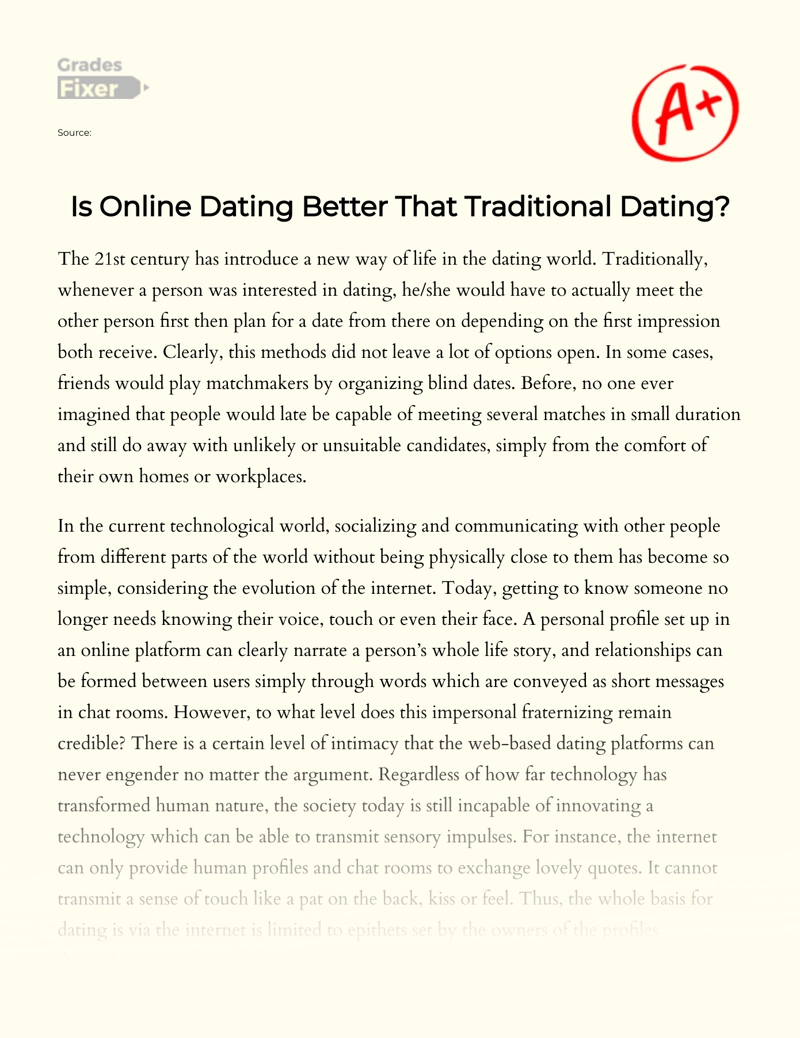
Still can’t find what you need?
Browse our vast selection of original essay samples, each expertly formatted and styled
Related Essays on Dating
Throughout human history, spanning over 30,000 years, communication has been the cornerstone of our evolution and dominance as a species. From rudimentary cave art to smoke signals, carrier pigeons to telephones, and now the era [...]
Our society continues to be affected both negatively and positively – as technologies become more and more integrated into our society. While many technologies have negative effects on our society’s ability to become more [...]
Getting on that first date can be particularly intimidating, especially when you are just starting to get to know each other better. This is also often true for couples who have gotten used to the presence of one another. What [...]
There are 3 distinct occupation levels represented in the case profile, plus the ground surface which only contains a few rubbles and the tip of the stone wall foundation. We labeled the very top layer of stratum underneath the [...]
Whenever someone thinks of Jane Austen, it is no surprise that they may think of her best-selling novel Pride and Prejudice. When people ask me to suggest a book for good reading, I always choose this novel. However, many [...]
Today s sadly growing trend in America is date rape. We hear about date rape on the news, in classrooms, and through school rumors almost daily. Fortunately, in recent years, the occurrences of violent rapes (those that are [...]
Related Topics
By clicking “Send”, you agree to our Terms of service and Privacy statement . We will occasionally send you account related emails.
Where do you want us to send this sample?
By clicking “Continue”, you agree to our terms of service and privacy policy.
Be careful. This essay is not unique
This essay was donated by a student and is likely to have been used and submitted before
Download this Sample
Free samples may contain mistakes and not unique parts
Sorry, we could not paraphrase this essay. Our professional writers can rewrite it and get you a unique paper.
Please check your inbox.
We can write you a custom essay that will follow your exact instructions and meet the deadlines. Let's fix your grades together!
Get Your Personalized Essay in 3 Hours or Less!
We use cookies to personalyze your web-site experience. By continuing we’ll assume you board with our cookie policy .
- Instructions Followed To The Letter
- Deadlines Met At Every Stage
- Unique And Plagiarism Free
The Differences Between Dating Online and In Person
We live in a fast paced, technology supercharged world, and many of our dating practices reflect that. People, especially successful adults, don’t have time to hang around and mingle with dating pools in real life. We’re simply too focused for that anymore. So how do you find a love match that makes your heart soar these days? And where are all the single people at? That’s where the best online dating sites come in.

Availability, Options, and Diversity
There are several differences between dating online and in person. For starters, your available singles dating pool is often much smaller in real life. There’s no competition with the amount of people available to mingle with in the online environment. You might also find a more diverse set of interests to find compatibility with online. Perhaps you like a certain sports team or you enjoy competition baking – there’s tons of potential love matches online to meet with these same interests, as opposed to in person dating, which may only yield one or two possible matches in your location.
Another big advantage of dating on the web is the ability to precisely pinpoint people you’re attracted to, and to bypass the rest. In real life, in-person dating, there’s no stopping that guy at the coffee shop or that annoying girl at school from continuing to try and make something happen. When you’re using an online matchmaker, you can just stop responding and let that fool pass you by. And if someone does get really pushy online, they can be reported to the site management with a quick click of a button.
Along the same lines as the last point, a big difference between real life and online dating is the overall security. With in-person dating, once someone gets your phone number and/or full name they have access to quite a bit of information about you. They can easily get your home address, your facebook profile, and many other personal details about you that you may not be ready to share yet. It’s amazing what the internet can provide to a creepy date with a simple search of your name and phone number.
When you use an online matchmaker, all communication is conducted securely within your account. You create a username, or just use your first name, so a possible weirdo doesn’t get your full name. Your phone number is also not revealed (unless you give it out to them, so always be careful when you share). All flirting and communicating is privately conducted through your membership account.
The Bottom Line
Meeting people on- and offline really boils down to the same basic elements – finding someone you really like and then interacting with them to learn more about both of your preferred desires; and seeing if that true love chemistry exists between you. This part of dating won’t change no matter how much technology you choose to use. So while online dating may be intimidating at first, it does offer several advantages to help keep you safe and support you in the most fun journey to love possible.

IMAGES
VIDEO
COMMENTS
Online dating allows for more time to make an intellectual connection without other distractions. There is a greater chance of being put in a more vulnerable situation meeting in real life at a bar. Alcohol can also give a false sense of a person's personality. Nevertheless, the online method can have its drawbacks as well.
Online dating is similar to real-life relations in that it can still lead to a face-to-face connection, ultimately making experiences the same. It is also possible for both types of dating to have a scenario where people from different parts of the world meet and end up together as a married couple.
From personal ads that began appearing in publications around the 1700s to videocassette dating services that sprang up decades ago, the platforms people use to seek out romantic partners have evolved throughout history. This evolution has continued with the rise of online dating sites and mobile apps. Today, three-in-ten U.S. adults say they have ever used an online dating site or app ...
Studies show that relationships formed on online dating platforms tend to become sexual much faster than other relationships. A French survey found that 56% of couples start having sex less than a ...
Relationships and Online Dating Essay. Table of Contents. The rising popularity of online communication changes the way people socialize. Friends and relatives can stay in touch and feel as though they are close to each other, even if they are at opposite corners of the world. Moreover, now people can find friendship and love online.
Communicating online can foster intimacy and affection between strangers, but it can also lead to unrealistic expectations and disappointment when potential partners meet in real life. Although many dating sites tout the superiority of partner matching through the use of "scientific algorithms," the authors find that there is little ...
As reported by Madden and Lenhart (2006), the Pew study found that Internet users were divided in their views about whether online dating is a good way to meet people (44% agreed, 44% disagreed), although more agreed than disagreed (47% vs. 38%) that online dating allows people to find a good match because they get to know a lot more people. In ...
Similarly, online dating increases the risks of meeting sex offenders and scammers. Lastly, a major concerned faced by those using cyber dates is security. Works Cited. Elisar, Shimrit. Everyone's guide to online dating: how to find love and friendship on the internet. Oxford: How To Books, 2007. Print. Knox, David.
Amid growing debates about the impact of smartphones and social media on romantic relationships, a Pew Research Center survey conducted in October 2019 finds that many Americans encounter some tech-related struggles with their significant others.. For instance, among partnered adults in the U.S. - that is, those who are married, cohabiting or in a committed relationship, roughly half (51% ...
online dating had higher romantic life satisfaction than others in the sample. People who perceive themselves to have had success using online dating provided higher ratings of life satisfaction, romantic life satisfaction, positive affect, and extroversion and indicated greater motivations to be using online dating tools to find love.
But, daters can't be too deceptive, lest they actually get to the point of a real life meeting in which they could be exposed. Catalina Toma, Jeffrey Hancock (both at Cornell University), and Nicole Ellison (Michigan State University) examined the relationship between actual physical attributes and online self-descriptions of online daters in ...
Key points. As online dating has grown more popular, more marriages today get their start online. A new study shows that people who meet their spouse offline are more satisfied. Online daters also ...
However, the great similarity which is the usual goal for both online dating and traditional dating styles is to meet someone they like, develop personal relationship, love affair, romantic relationship, sexual relationship, and to establish a courtship in which the both parties study their characters, behaviors, caring, and marriage. 1105 Words.
Online dating is a personal introductory kind of a system where individuals find and contact one another over the internet to arrange a meeting or a date for that matter with the intention of developing a romantic, personal or sexual relationship. On the other hand, traditional dating involves meeting a person face to face for the first time ...
Relationships that are purely online may not have the same intimacy," Saltz says. There are benefits to spending time together in person. You can do activities together, share meals, create memories, and laugh in real time. "Humans are physically and emotionally hard-wired to desire connection, and physical contact is a main source for that ...
However, it is essential to recognize the potential risks associated with online dating, including fraudulent activity, privacy breaches, and emotional distress. By exercising caution and vigilance, individuals can maximize the benefits of online dating while minimizing the associated risks. This essay was reviewed by.
CON: It's Tough For Shy People. This is sort of a pro, sort of a con. Online dating seems to favour introverted people, while extroverts probably find real-life dating their strength. If you're a shy person, you might find it hard to meet new people and strike up conversations with strangers. It might be tough for you!
The relationship between gender, social support, and health-related quality of life in a community-based study in Washington County, Maryland, Quality of Life Research, vol. 16, no. 5, pp. 777-786 ...
This is a compare and contrast essay written about online and in-person dating. The paper's author mentions that online dating is better for introverts, while in-person dating can be better for extroverts who like to attend gatherings and go to bars. The author also discusses how, while online dating can be safer, it can also have drawbacks ...
Additionally, online dating proved its effectiveness over traditional dating through its success. According to Hayley Matthews, it is estimated that "1 in 5 relationships and a little more than 1 in 6 marriages begin online". This shows that online dating does work, many people start their relationships online.
Recent surveys say that dating apps are the No. 1 way people meet today, and nearly 70 percent of individuals who met someone on a dating app said it led to a romantic, exclusive relationship. I ...
From a personal perspective, this actually depends on the person who seeks for love from online platforms. Whether marriage or just a casual relationship, online dating has caused high rates of break ups compared to traditional forms of dating. According to (Paul, 2014), in spite the intentions a person has when deciding to use online dating ...
The Negatives of Traditional Dating (#10-12) Now for the bad news about traditional dating. Whether it's pulling yourself away from Netflix or agreeing to at least meet your friend's cousin's best friend, looking for a date offline has aspects that you're not going to enjoy. 10. It Takes More Time & Effort.
When you're using an online matchmaker, you can just stop responding and let that fool pass you by. And if someone does get really pushy online, they can be reported to the site management with a quick click of a button. Security. Along the same lines as the last point, a big difference between real life and online dating is the overall security.